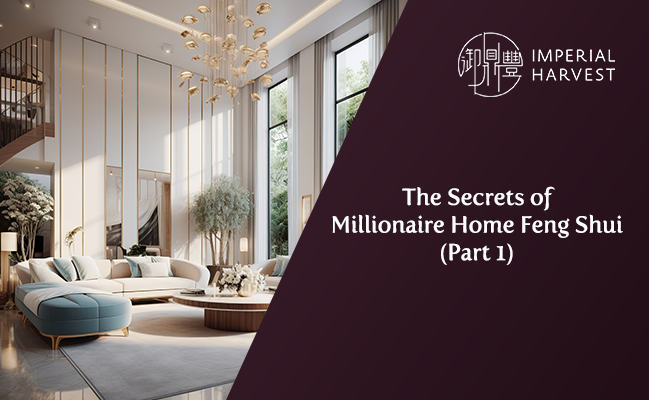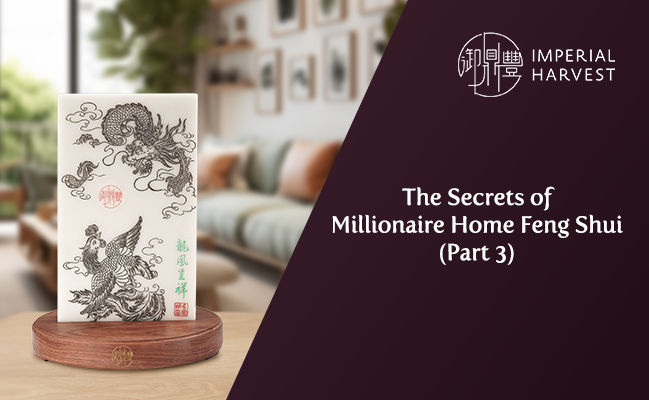

Posted by Imperial Harvest on 10 May 2024
The Secrets of Millionaire Home Feng Shui (Part 2)
Estimated Reading Time: 8 mins
The Form School of Feng Shui (形家风水) is a foundational branch of Feng Shui that emphasises the significance of environmental shapes and forms. It examines how the configuration of landscapes, buildings, roads, and bodies of water affects the flow of Qi energy, influencing the well-being and prosperity of the occupants.
External Form Evaluation entails the commonly encountered Sha Qi of the surroundings.
Angled or Staggered Arrangement of Buildings
According to the Form School of Feng Shui, the positioning and layout of buildings play a crucial role in influencing the circulation and quality of Qi — the essential energy that permeates any environment. This school of thought emphasises the importance of architectural harmony in fostering a positive energy flow.
A staggered arrangement, where structures’ edges intersect, can generate a detrimental force known as Wall Knife Sha (壁刀煞). This phenomenon refers to the sharp, slicing energy emitted by the corners of buildings, metaphorically cleaving through the atmosphere and directing harmful Qi towards adjacent structures or entrances. Wall Knife Sha can lead to occupants experiencing persistent financial instability, unexpected health issues, and relationship challenges.
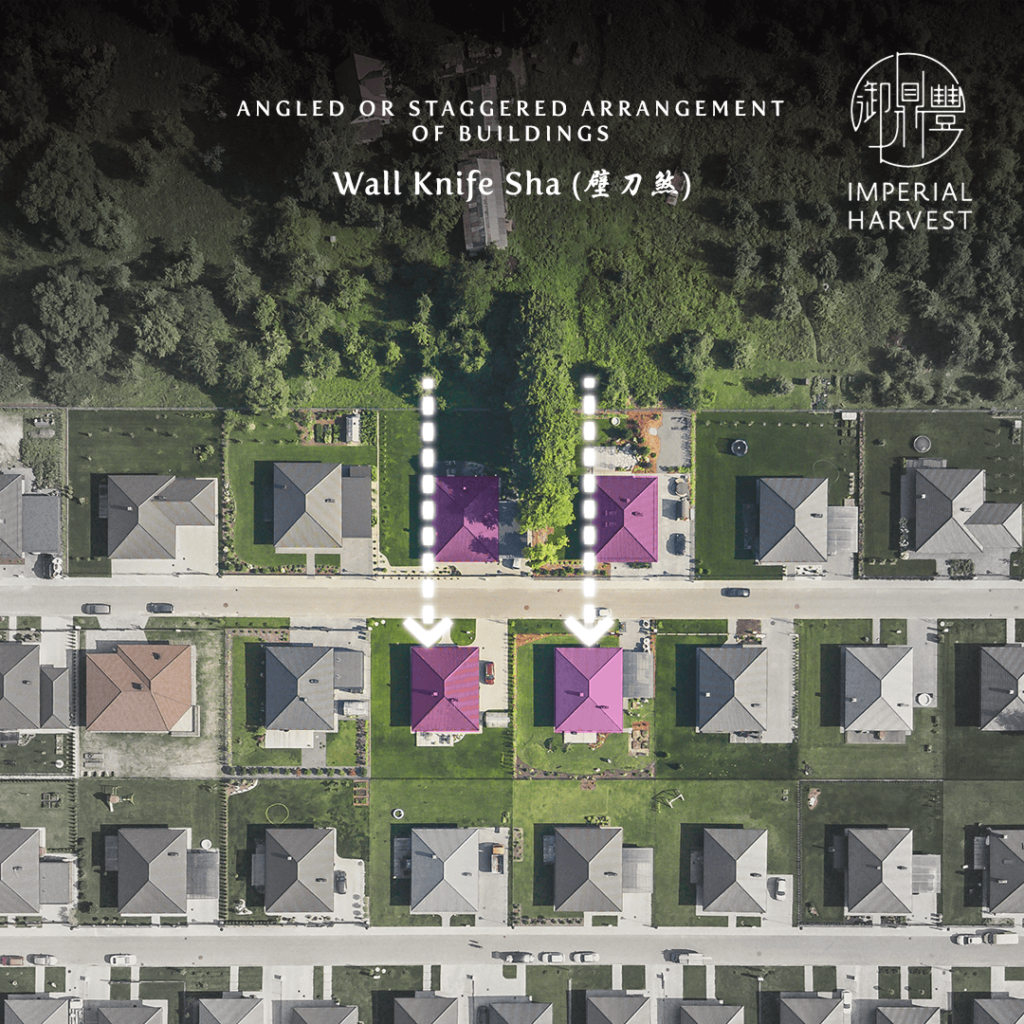
Similarly, an angled configuration, where sharp corners directly oppose one another, gives rise to another negative energy known as “Knife Edge Sha” (斜刀煞). Both Wall Knife and Knife Edge Sha are believed to adversely impact health and financial prosperity, potentially disrupting the well-being and fortune of individuals residing or working within such spaces.

Furthermore, when a building faces a gap between two opposite buildings, it encounters what is known as Heaven Cutting Sha (天斩煞). This specific arrangement disrupts the smooth flow of Qi around a residence, potentially leading to negative impacts on the occupants’ health and prosperity.
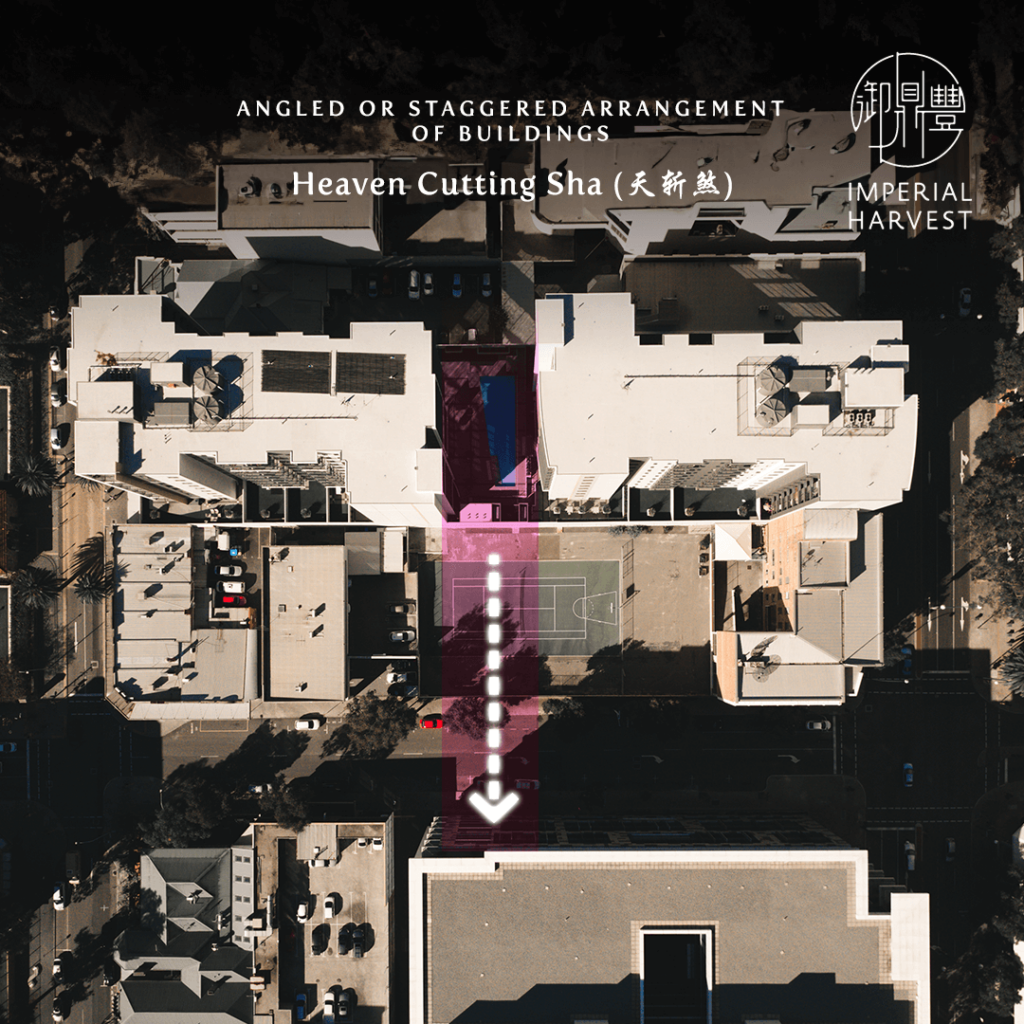
These principles from the Form School of Feng Shui highlight the key importance of mindful architectural planning and orientation. By considering these elements, architects and planners can ensure a harmonious and auspicious energy flow, thereby enhancing the quality of life for building occupants. Adopting strategic design elements such as shielding techniques, placement of barriers, or even selecting alternative orientations can mitigate these harmful energies and promote a healthier living and working environment.
1. Principle of Eight Trigrams
Applying the principle of Eight Trigrams involves analysing the family members, body parts, and the year of occurrence of the unfortunate event caused by the presence of Sha Qi.
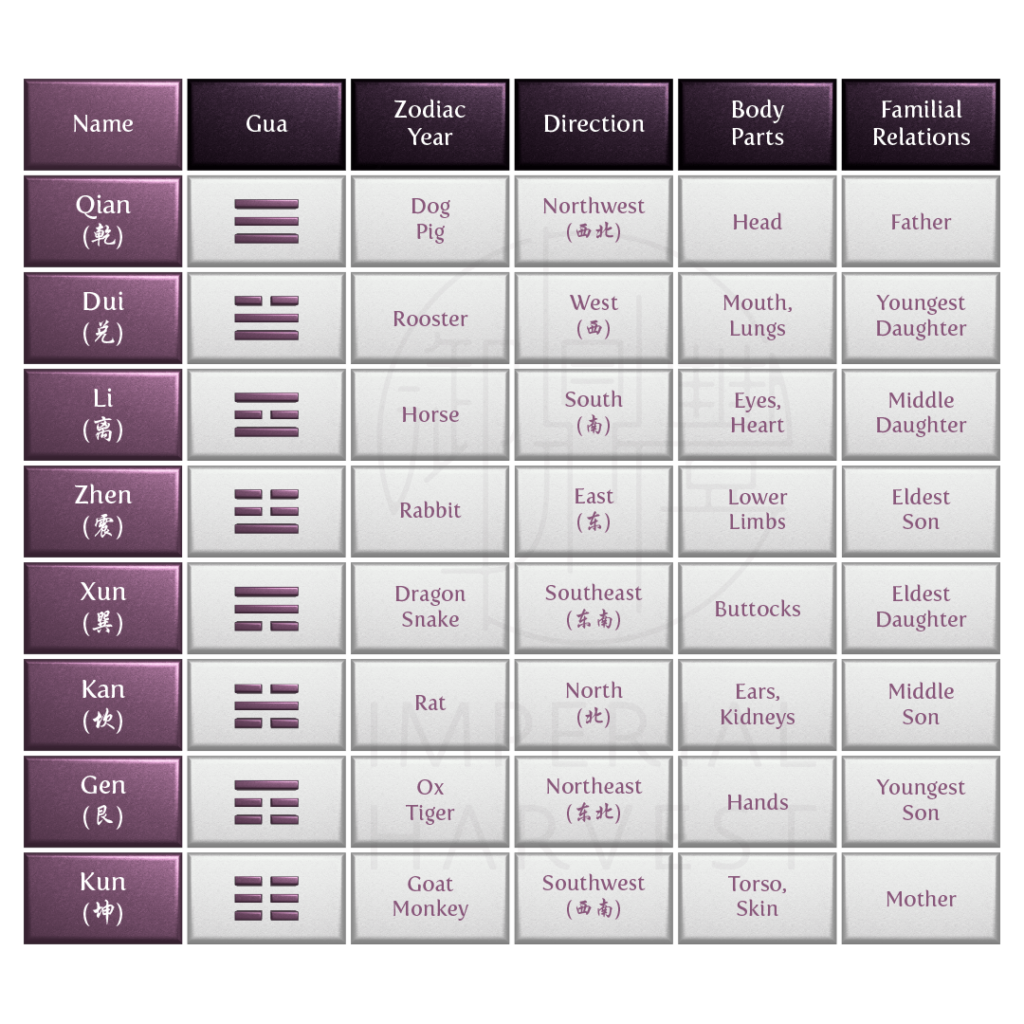
If a Sha Qi is detected in the West sector of the house, an Imperial Feng Shui master can predict that the family members residing in the house are likely to suffer from mishaps or accidents during the year of the Rooster.
2. Nature of Building
According to the Form School of Feng Shui, specific types of buildings and their surrounding environments play crucial roles in influencing the energy—or Qi—of a place. Places of worship, such as temples and churches, along with medical institutions like hospitals and polyclinics, are traditionally seen as strong centres of Yin energy. Yin, characterised by qualities of stillness, darkness, and passivity, dominates in areas associated with introspection, health recovery, and spiritual activities.
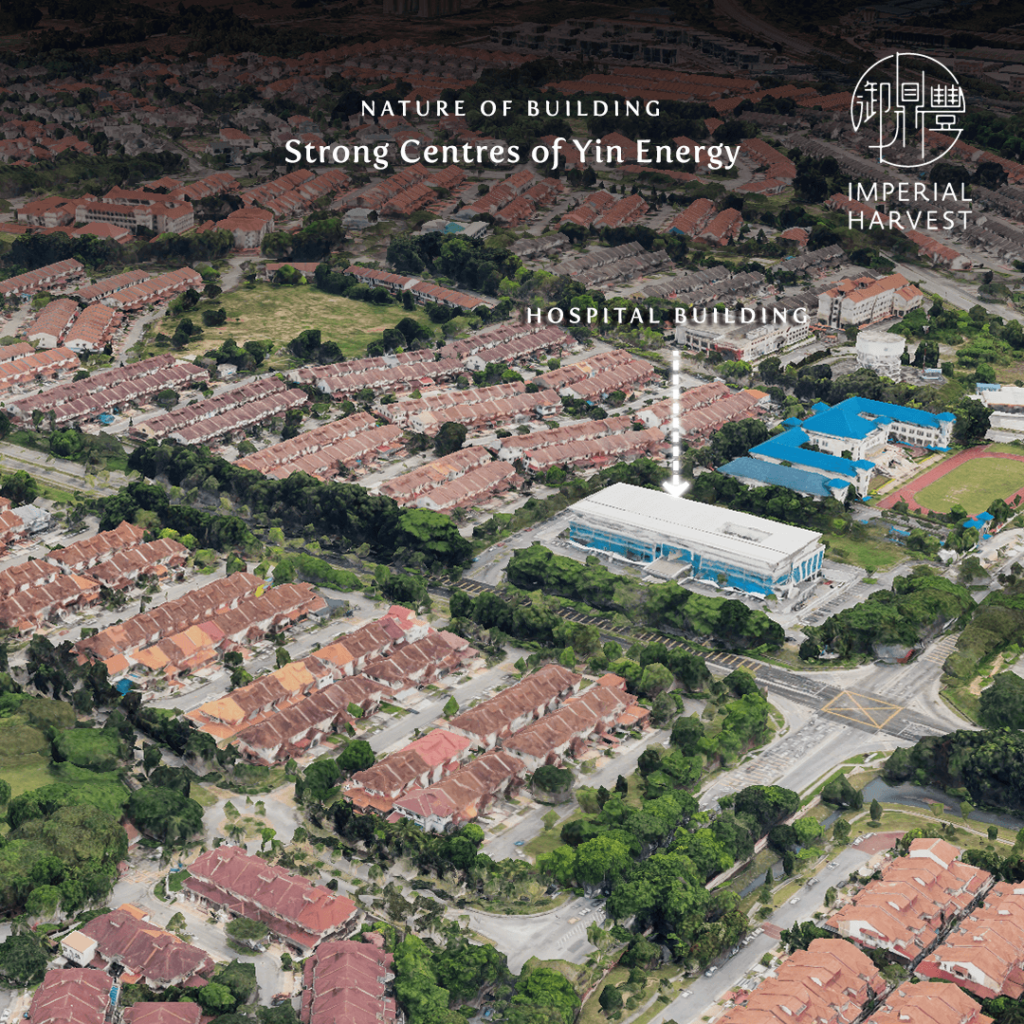
From a Feng Shui perspective, residing too close to such Yin-heavy locations is often considered unfavourable. Excessive Yin energy can lead to a stagnation of Qi in one’s living environment, potentially causing feelings of lethargy, melancholy, or other negative impacts on residents’ well-being. Therefore, while these places are important in society for spiritual and health-related purposes, maintaining a certain distance from them in residential planning is advisable to achieve a balanced and harmonious energy flow.
3. Roads
In the Form School of Feng Shui, roads are regarded as channels for energy flow, influenced by the movement of vehicles and the design of the thoroughfare. The traffic direction, road layout, and shapes are all pivotal factors in determining the prosperity and well-being of occupants residing nearby.
T-Junction Sha (路冲煞): This phenomenon occurs when a house directly faces a T-junction, where traffic rushes towards the property before diverging left or right. The concentrated energy flow is considered excessive and labelled as ‘Sha Qi’. Known as T-junction Sha, it is associated with potential accidents, misfortunes, and instability in one’s career or life endeavours.
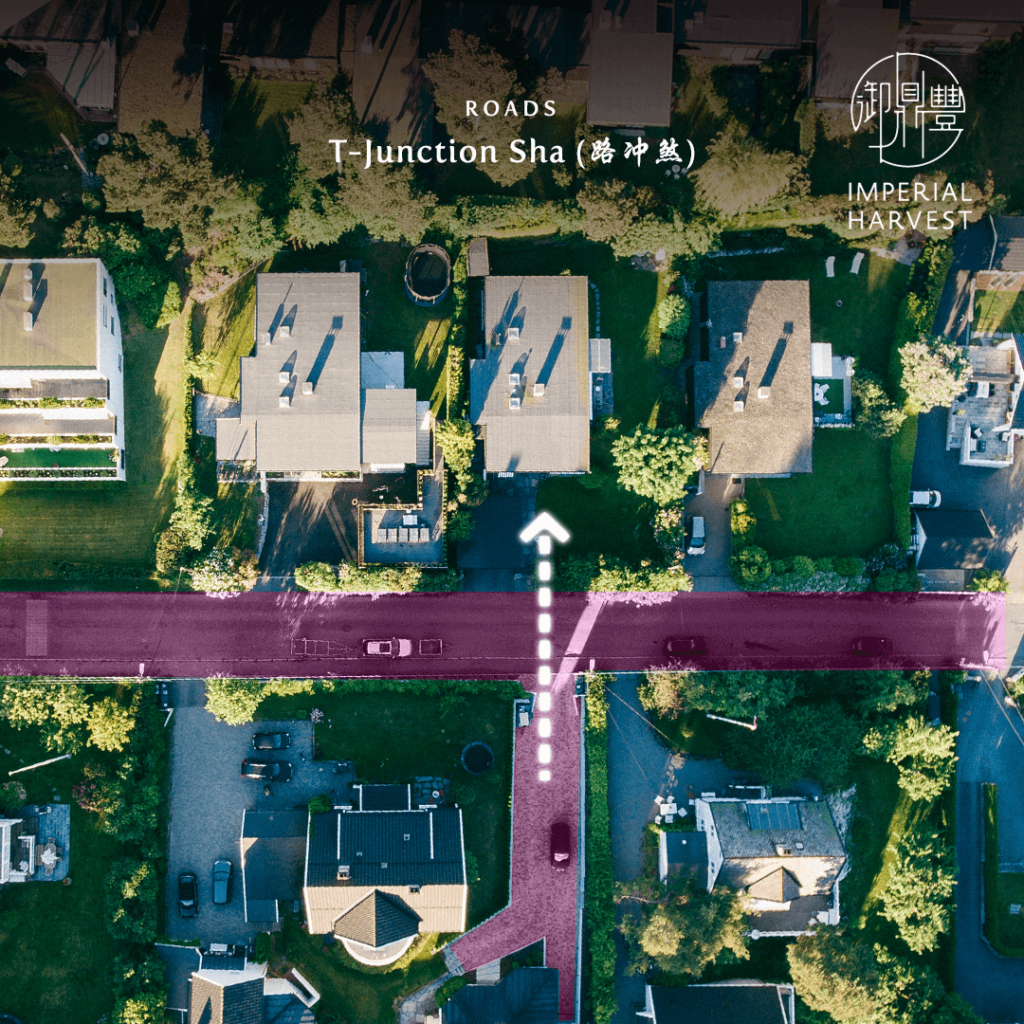
Curved Blade Sha (弯刀煞): This term is used when a house is positioned facing the convex side of a curved road, resembling a blade slicing into the property. Known as Curved Blade Sha, it is believed to potentially induce severe health issues, possibly necessitating medical intervention or surgical treatment.
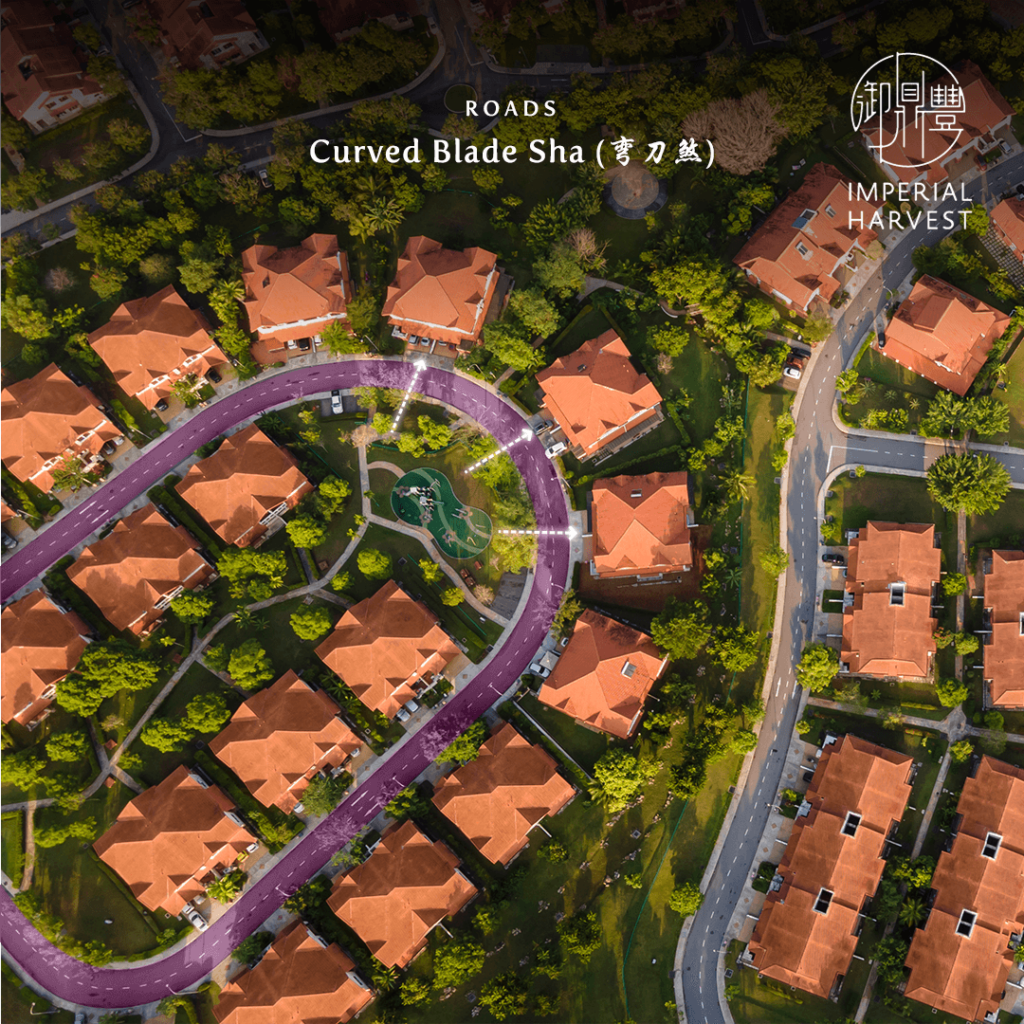
Cutting Waist Sha (拦腰煞): This Sha manifests when a building is positioned adjacent to an elevated road or bridge, with the elevated structure metaphorically compared to a blade slicing across the building’s waist. Occupants may encounter setbacks in their careers, experience disruptions in business deals, or face mid-life crises, including health-related challenges. Cutting Waist Sha highlights the significance of carefully considering the placement and orientation of buildings concerning surrounding infrastructure to alleviate potential negative impacts on occupants’ lives and well-being.

Applying the principles of the Eight Trigrams and identifying the position of Sha Qi relative to the residence, Imperial Feng Shui masters can predict the timing of events associated with different types of Sha Qi.
Internal Form Evaluation entails the commonly encountered Sha Qi within the house
The study of form encompasses the house’s layout, which is divided into four major segments.
Kitchen
The kitchen plays an important role in governing the household’s prosperity. Specific placement and orientations of the kitchen stove are essential for cultivating positive energy throughout the home. Arranging the kitchen with the following negative forms can result in unnecessary challenges, hindrances, and obstacles in life.
Misalignment of Kitchen Stove
Stove facing kitchen door or cabinet: A kitchen stove facing the kitchen door or the balcony is an inauspicious form feature that results in the inability to retain wealth and unexpected financial losses.
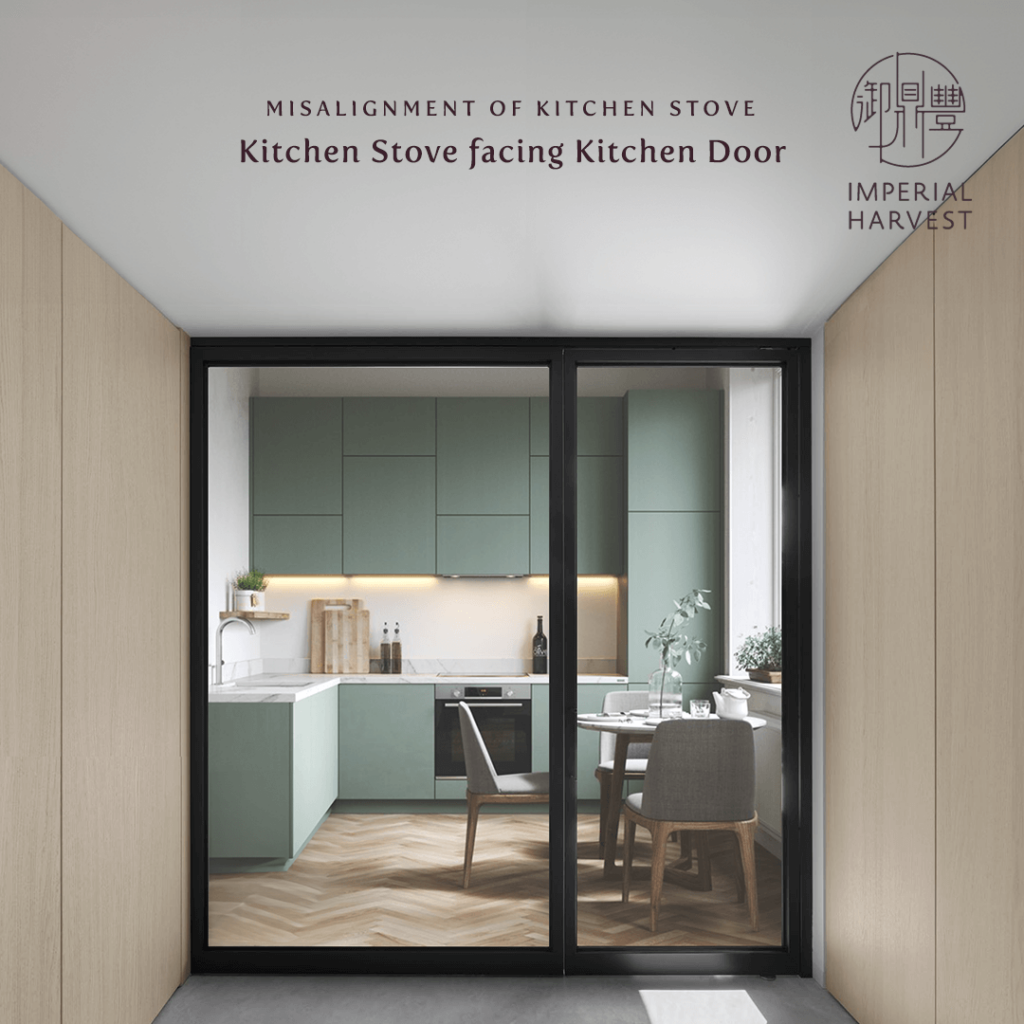
Stove facing half of kitchen door or cabinet: If the kitchen stove faces half of the kitchen door or cabinet, it represents an inauspicious form feature as the misaligned kitchen stove would be facing the edge of the kitchen door or cabinet, resulting in the manifestation of “Wall Knife Sha”. This can lead to occupants experiencing persistent financial challenges, unwanted health issues, and relationship troubles.
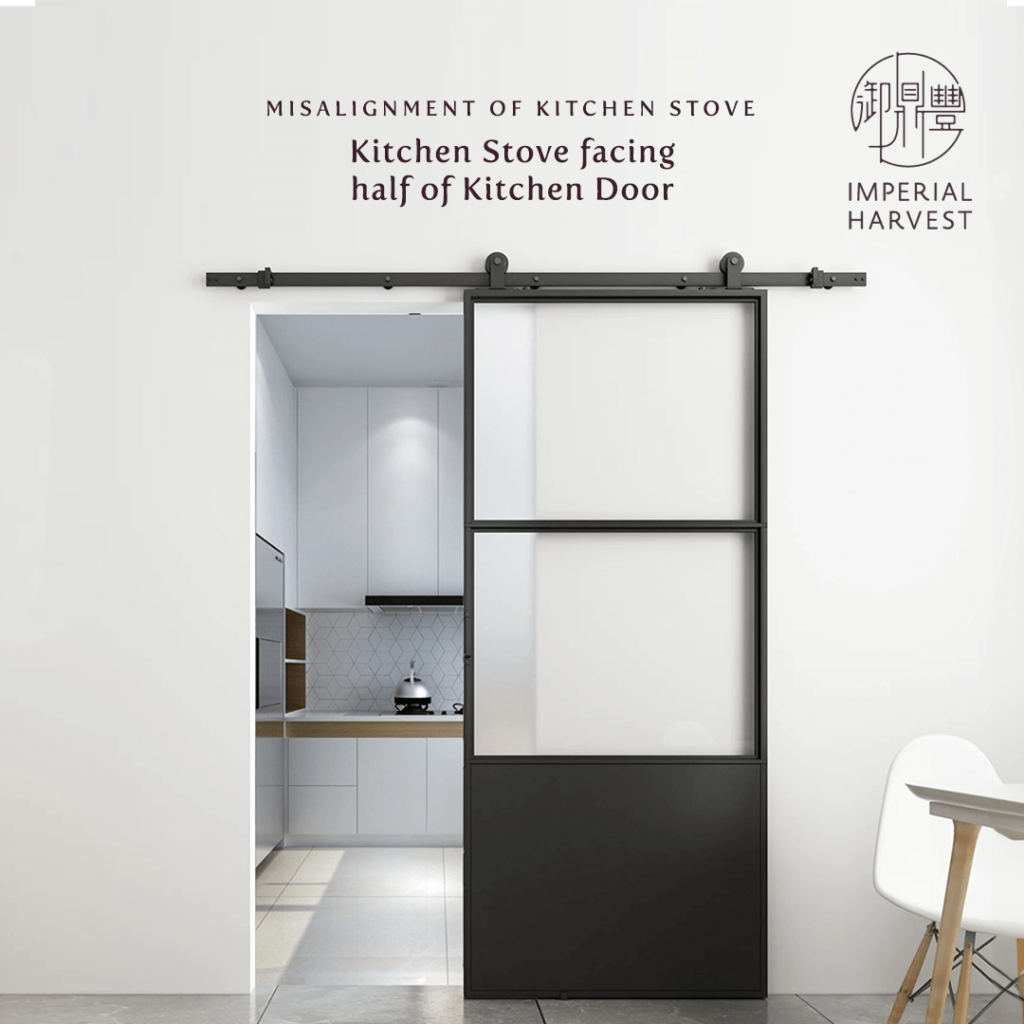
Elemental Clash of Kitchen Stove
The kitchen stove symbolises the fire element, whereas the West and Northwest sectors represent the metal element, and the North sector represents the water element.
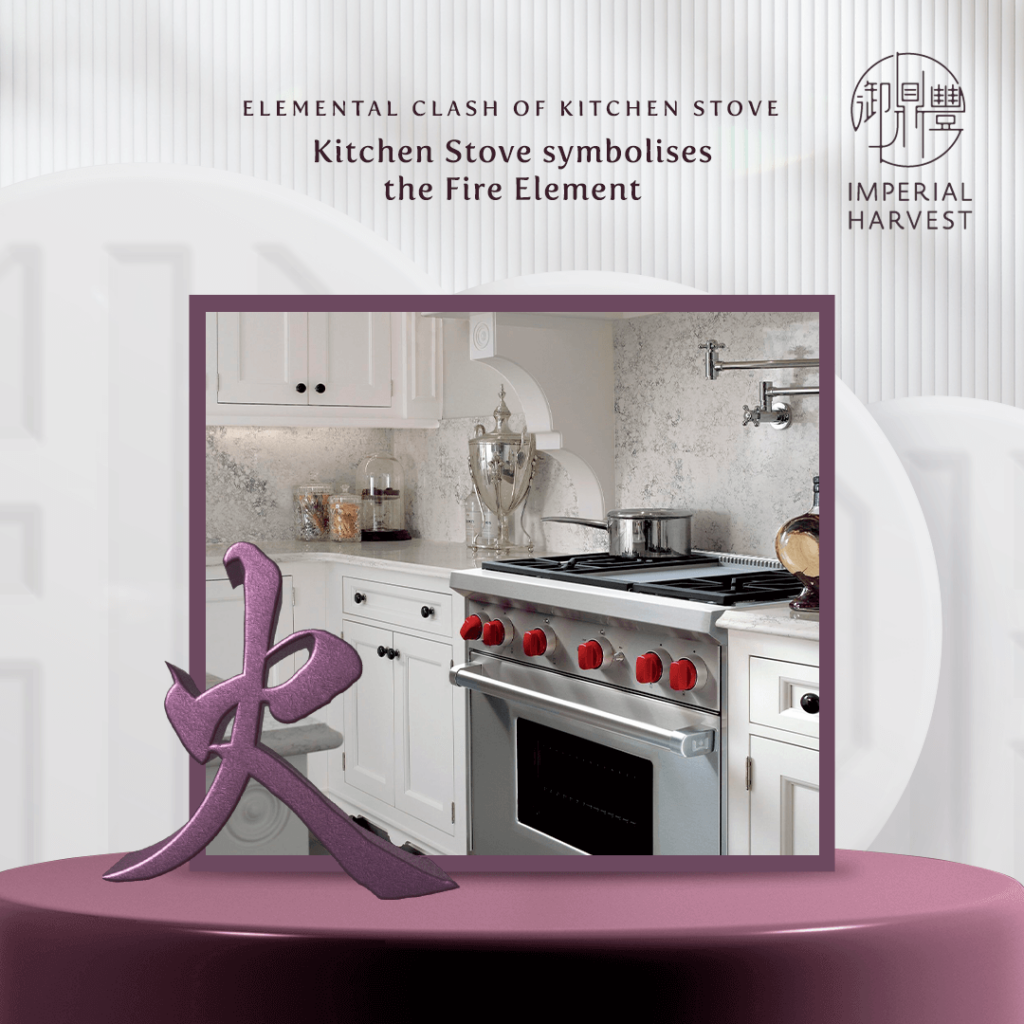
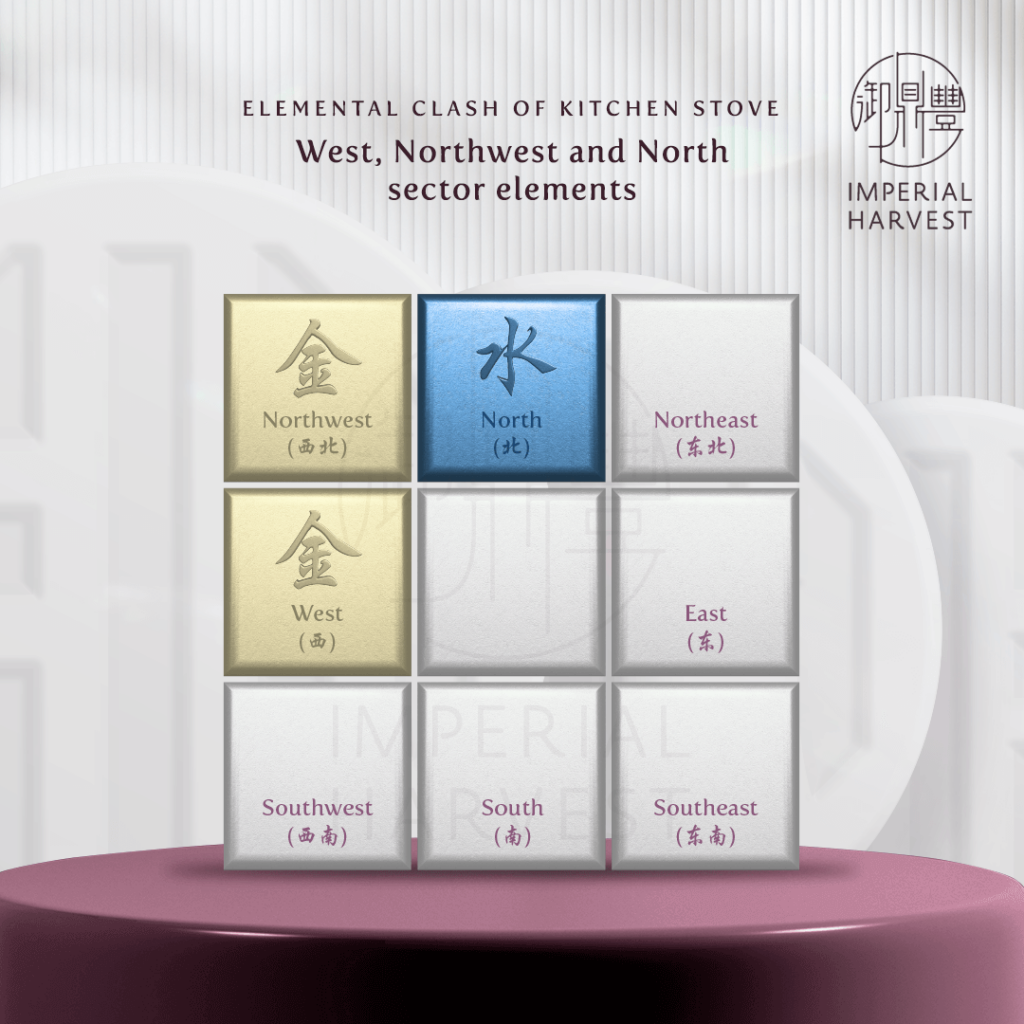
When the stove is located in the Northwest or West sector of the house, it engenders a fire-metal elemental conflict, potentially leading to family disharmony, unexpected financial challenges, and an inability to accumulate wealth. Similarly, placing the stove in the North sector of the house results in a Water-Fire clash, which can create reproductive organ issues.
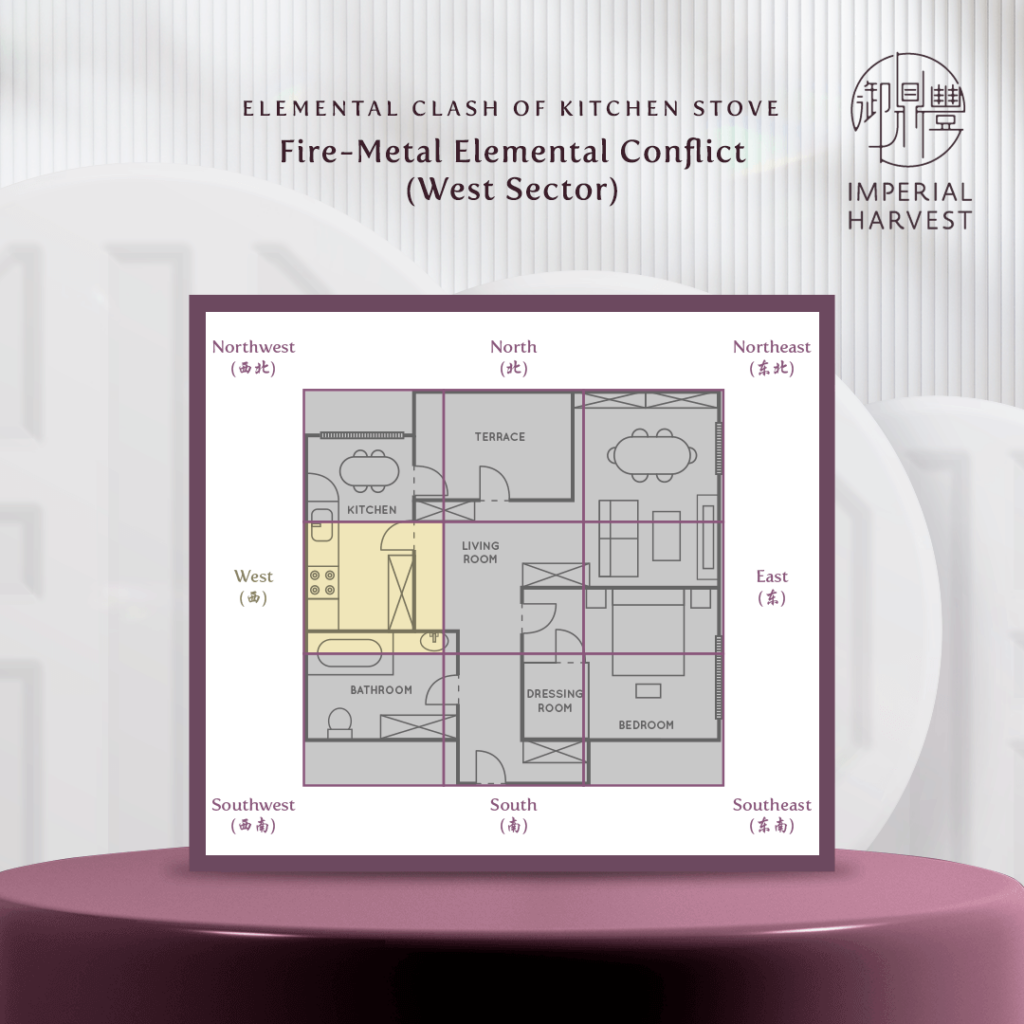
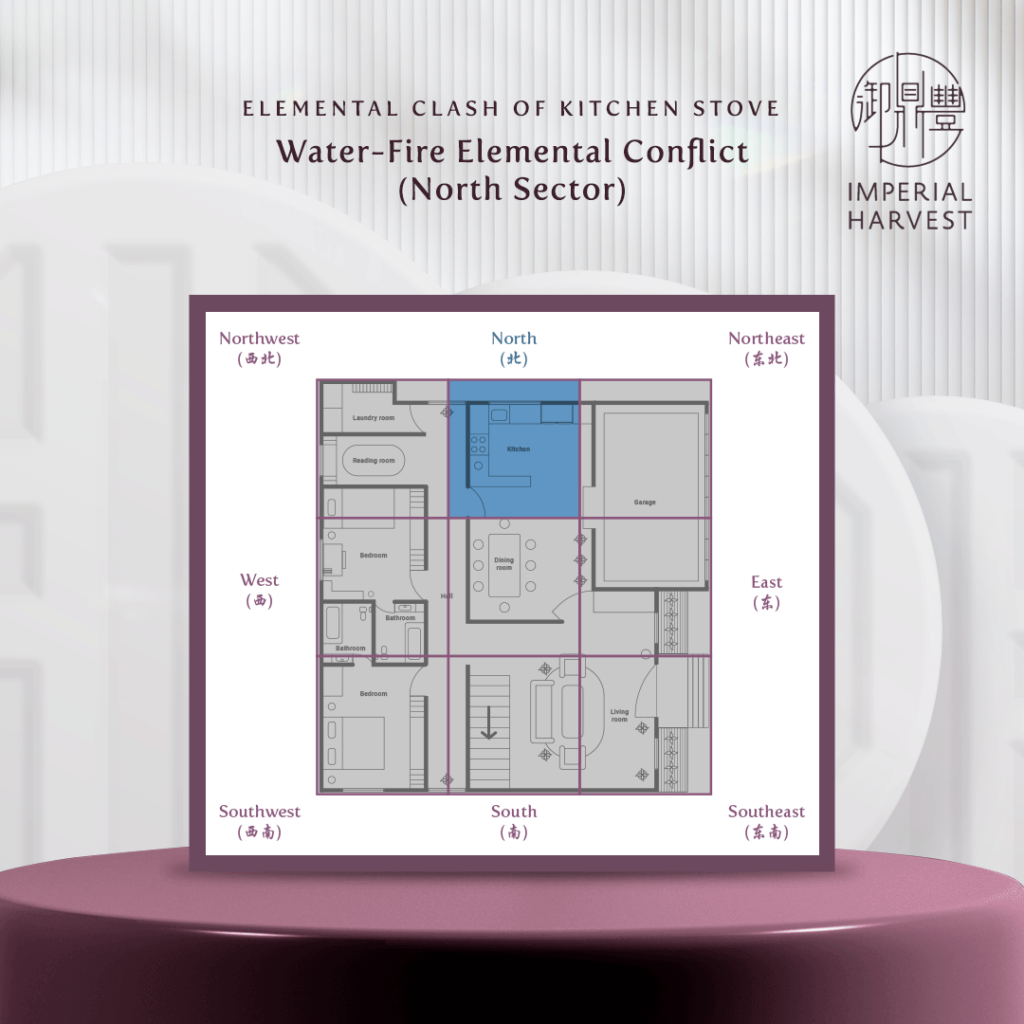
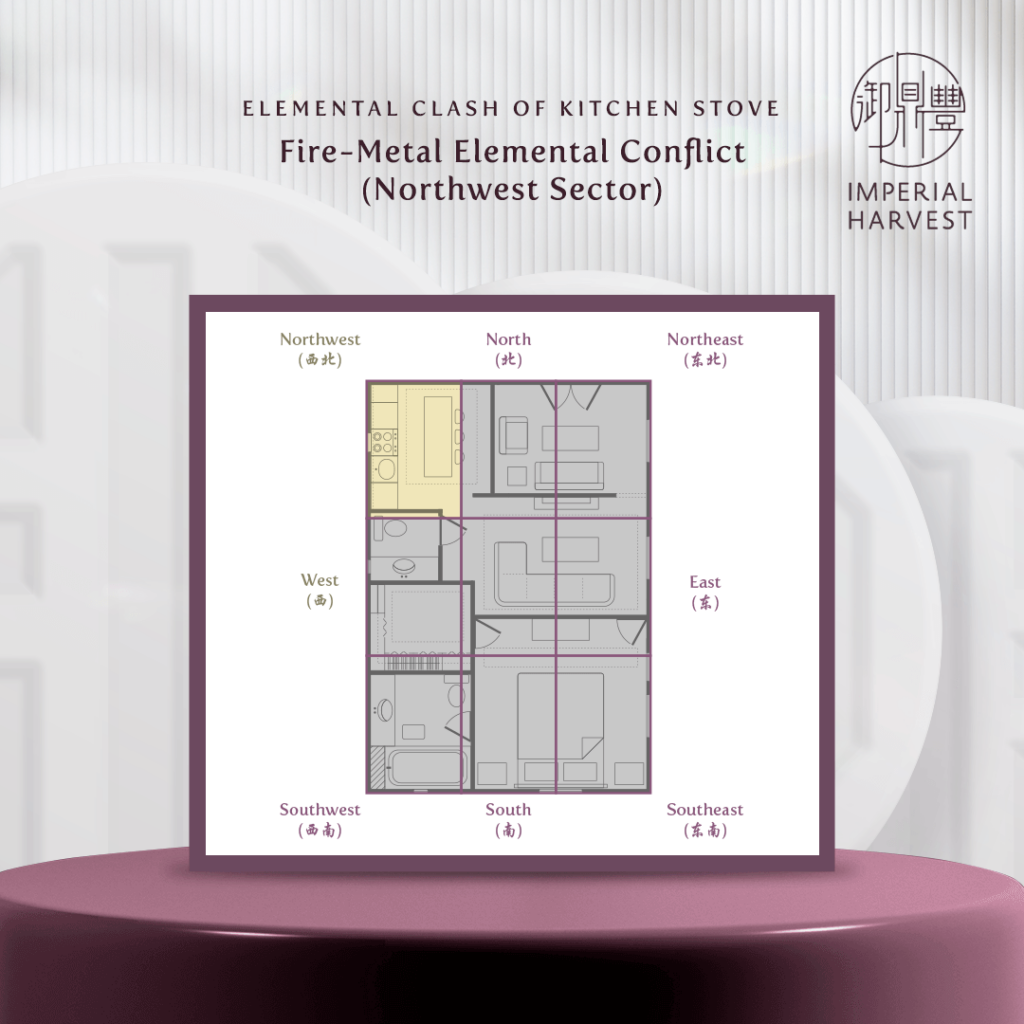
Furthermore, an elemental clash of the stove can arise when it is placed directly opposite the basin, representing the water element. This clash between Water and Fire elements can lead to disharmony and conflict at home.
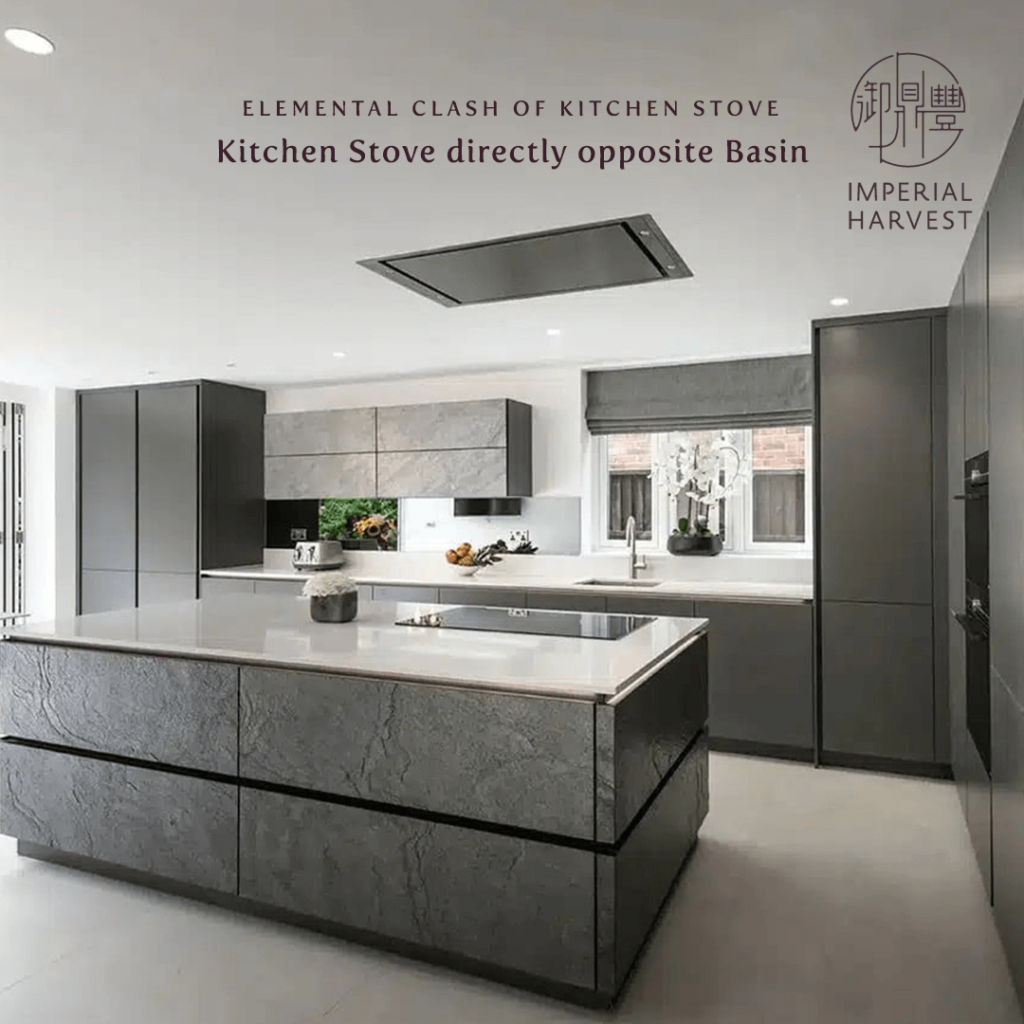
Poor Form of the Kitchen
Stove placed against a window: Positioning the kitchen stove with its back against a window signifies a lack of support (靠山), potentially leading to family disharmony and financial setbacks.
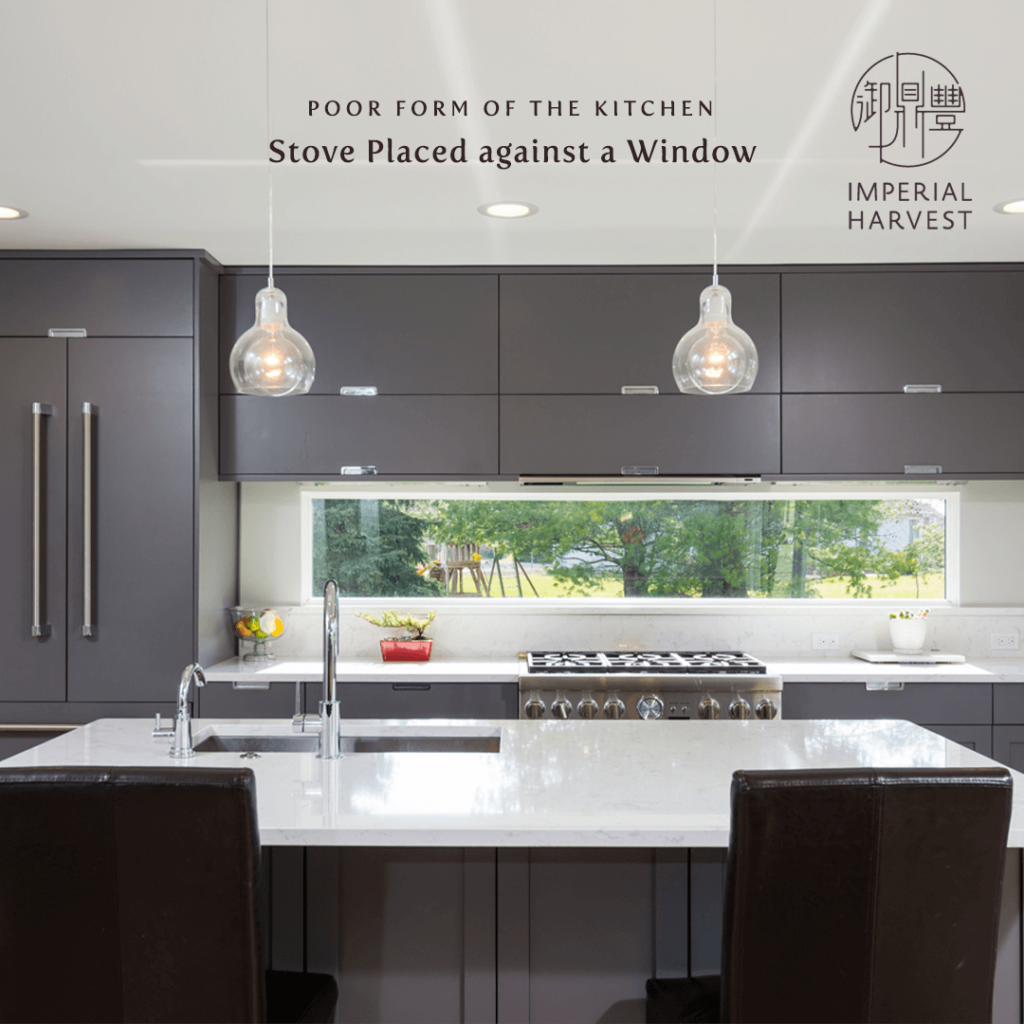
Stove under a beam: Situating the kitchen stove under an overhead beam can result in Suppression From Beam Sha (横梁煞), leading to mental health issues and unexpected financial losses.
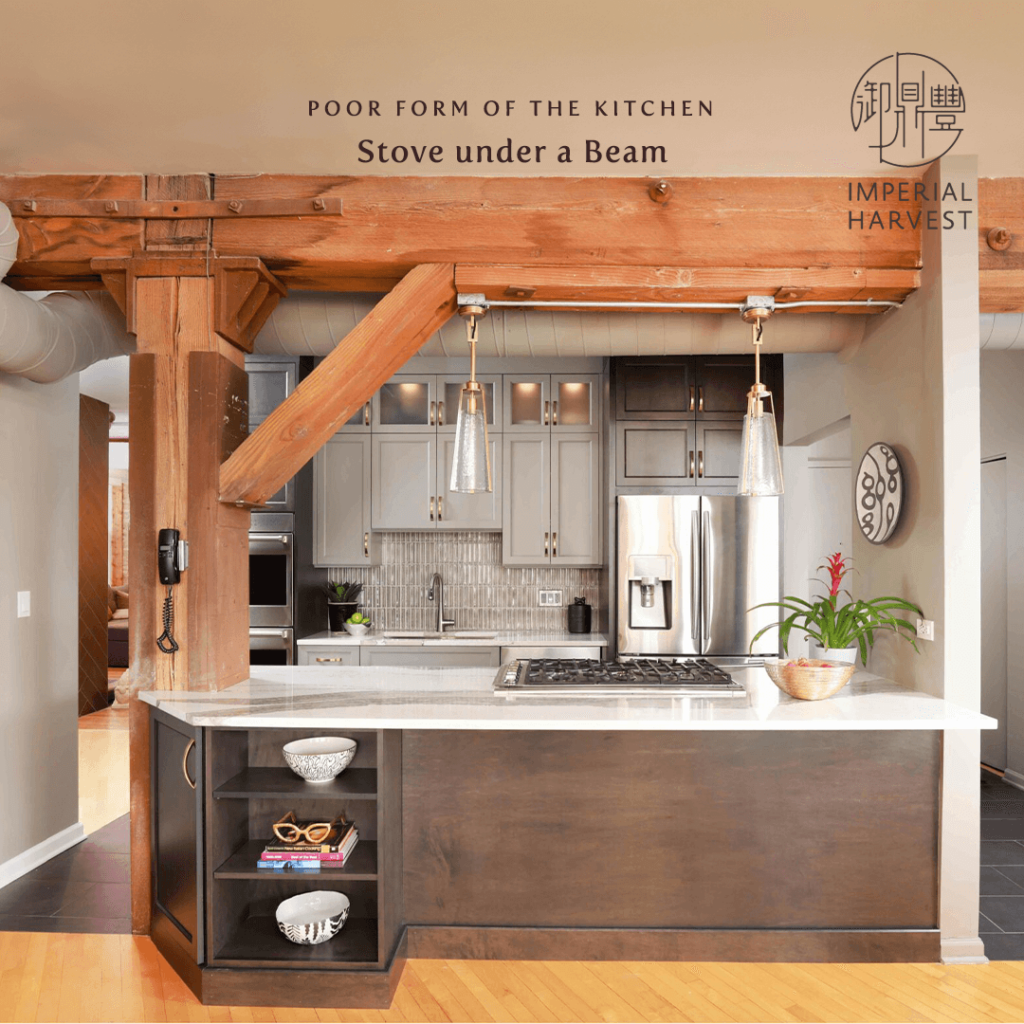
Bedroom
The bedroom holds significant importance in the Form School of Feng Shui, impacting career performance, workplace relationships, and overall health. Proper arrangement and orientation are essential for cultivating positive energy and avoiding obstacles.
Misalignment of the Bed
Bedroom door facing the bed: When the bedroom door directly faces the bed, it exposes specific body parts to drafts and wind during sleep, potentially causing chronic health issues. The resulting airflow from doors and windows can lead to functional disorders and other persistent problems.

Bathroom door facing the bed: When the bathroom door faces the head, it can cause significant health issues such as headaches, concentration difficulties, and even tumours. If the bathroom door faces the waist, it may lead to back pain and heart problems, potentially escalating to diabetes or heart disease. Facing the feet can result in sciatica, knee pain, or gout, which may eventually lead to fractures.
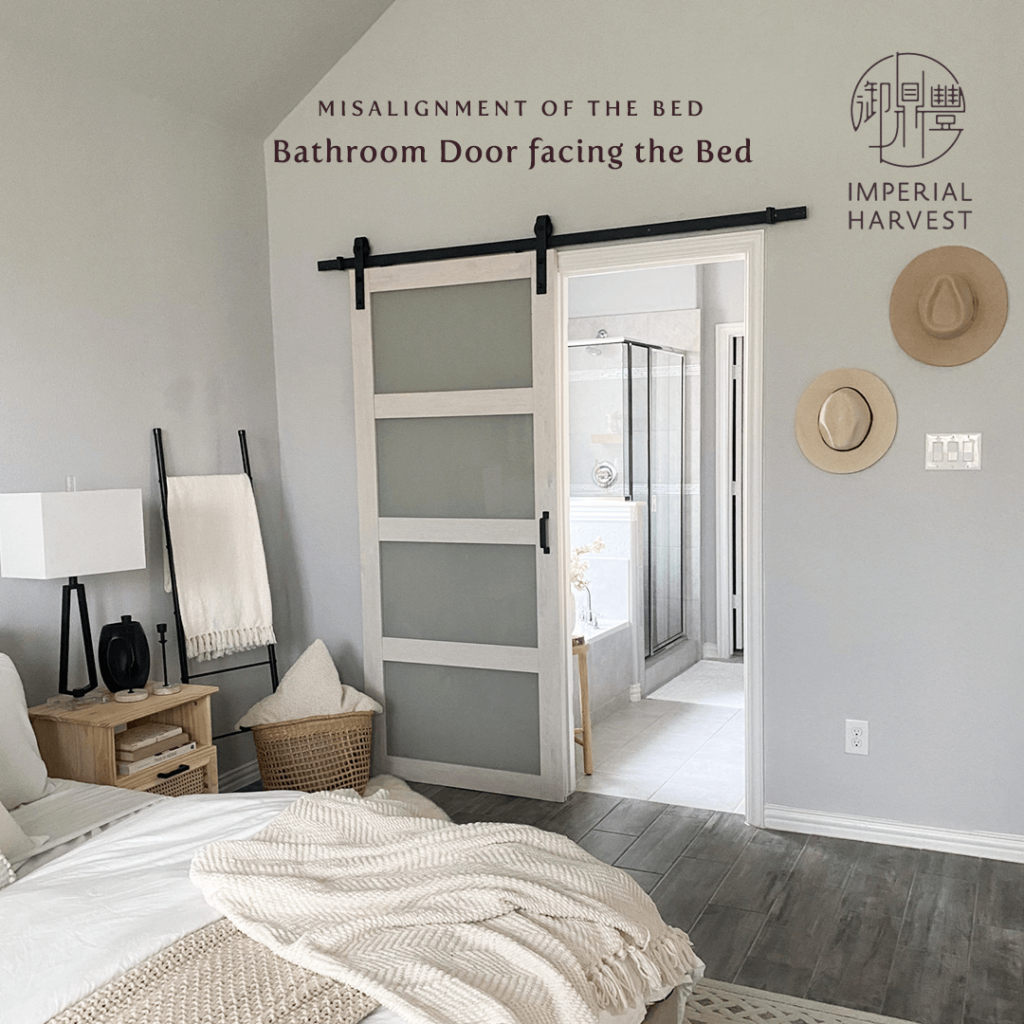
Mirror facing the bed: A mirror facing the bed can cause mental confusion and difficulty concentrating. Mirrors should only be placed on either side of the headboard. Otherwise, use dressing cabinets with doors to conceal mirrors when not in use.
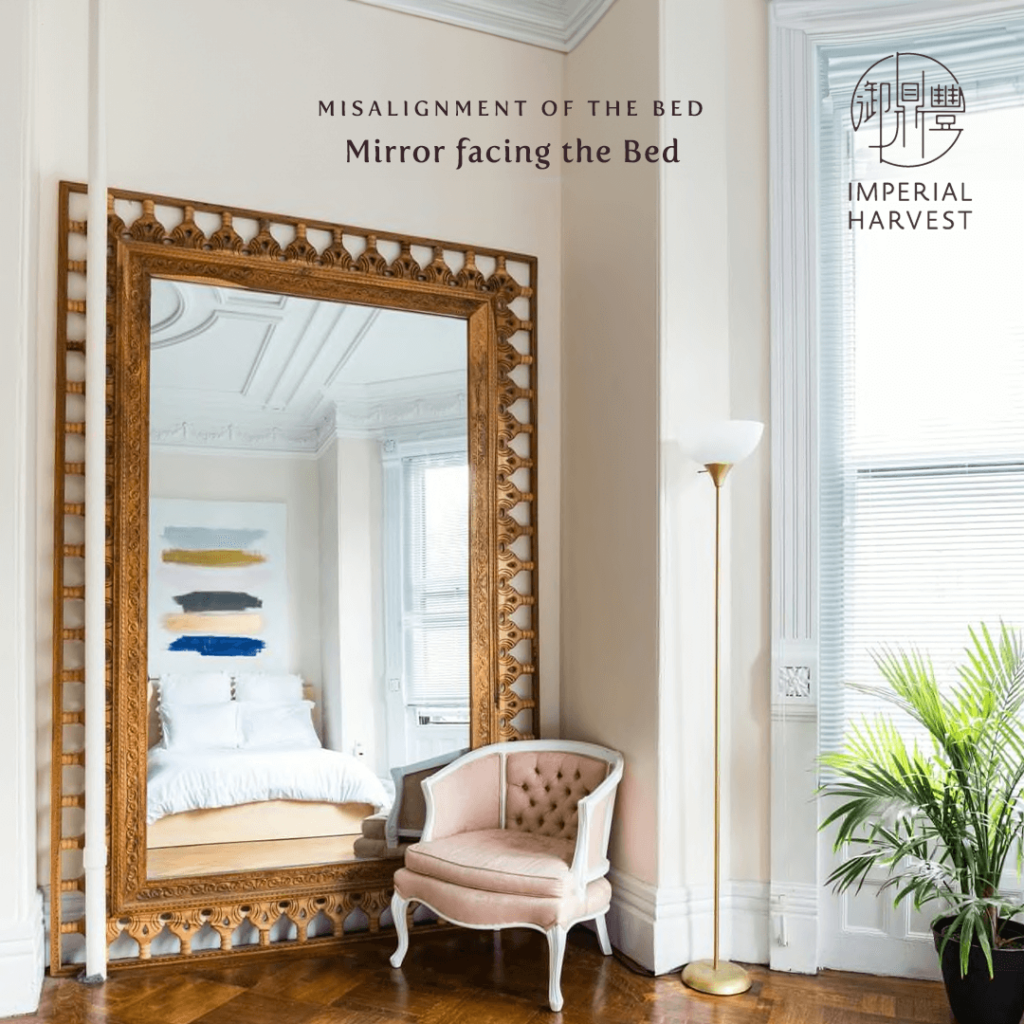
Poor Form of the Bedroom
Bed headboard against toilet wall: Sleeping with the bed headboard against a toilet wall may cause confusion, headaches, and difficulty concentrating. Prolonged exposure may even increase the risk of brain tumours.
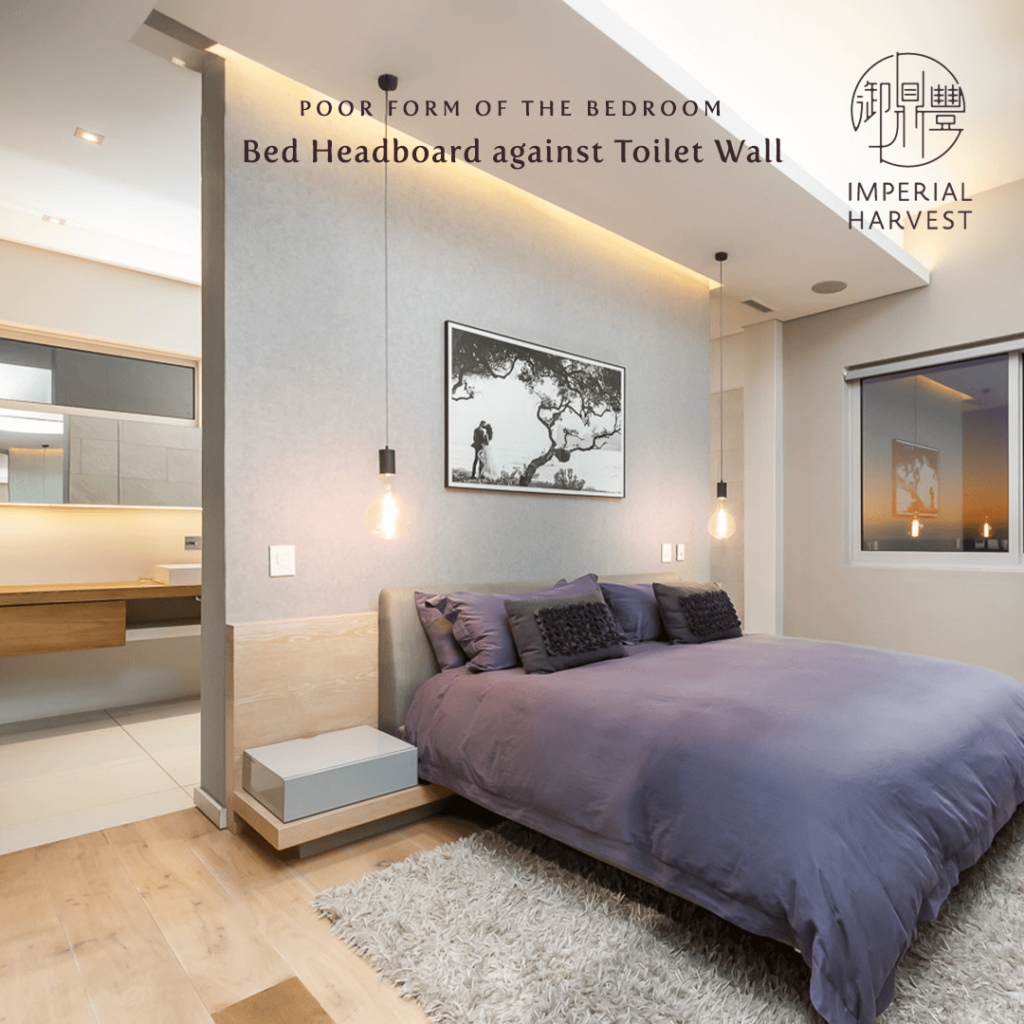
Bed under a beam: Positioning a bed directly under an overhead beam creates Suppression From Beam Sha, potentially leading to mental health issues, insomnia, and financial losses.
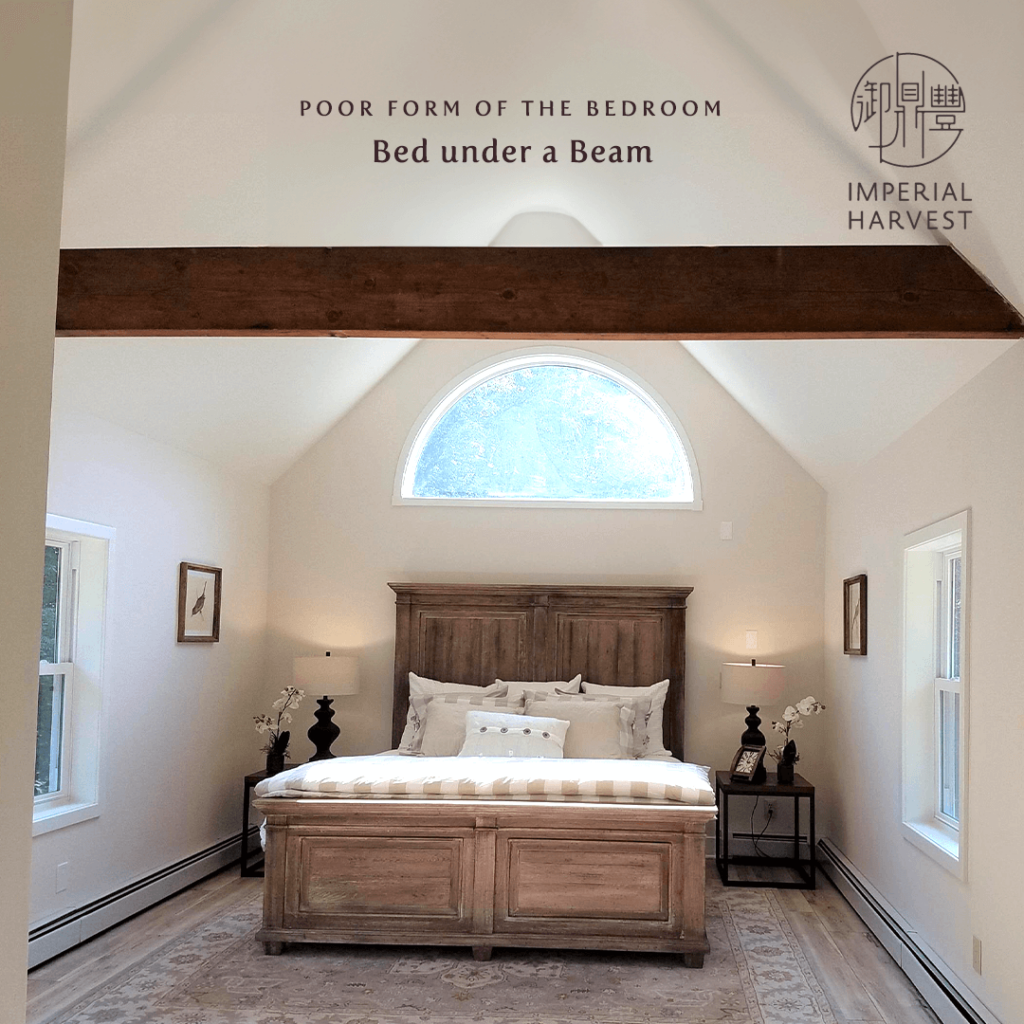
Bed under a staircase: Positioning a bed directly under a staircase may lead to poor sleep quality and frequent nightmares.

Bed facing wall knife: If the bed faces a wall knife — often found in corner rooms of high-rise buildings — it may cause headaches, dizziness, and other adverse health effects over time.
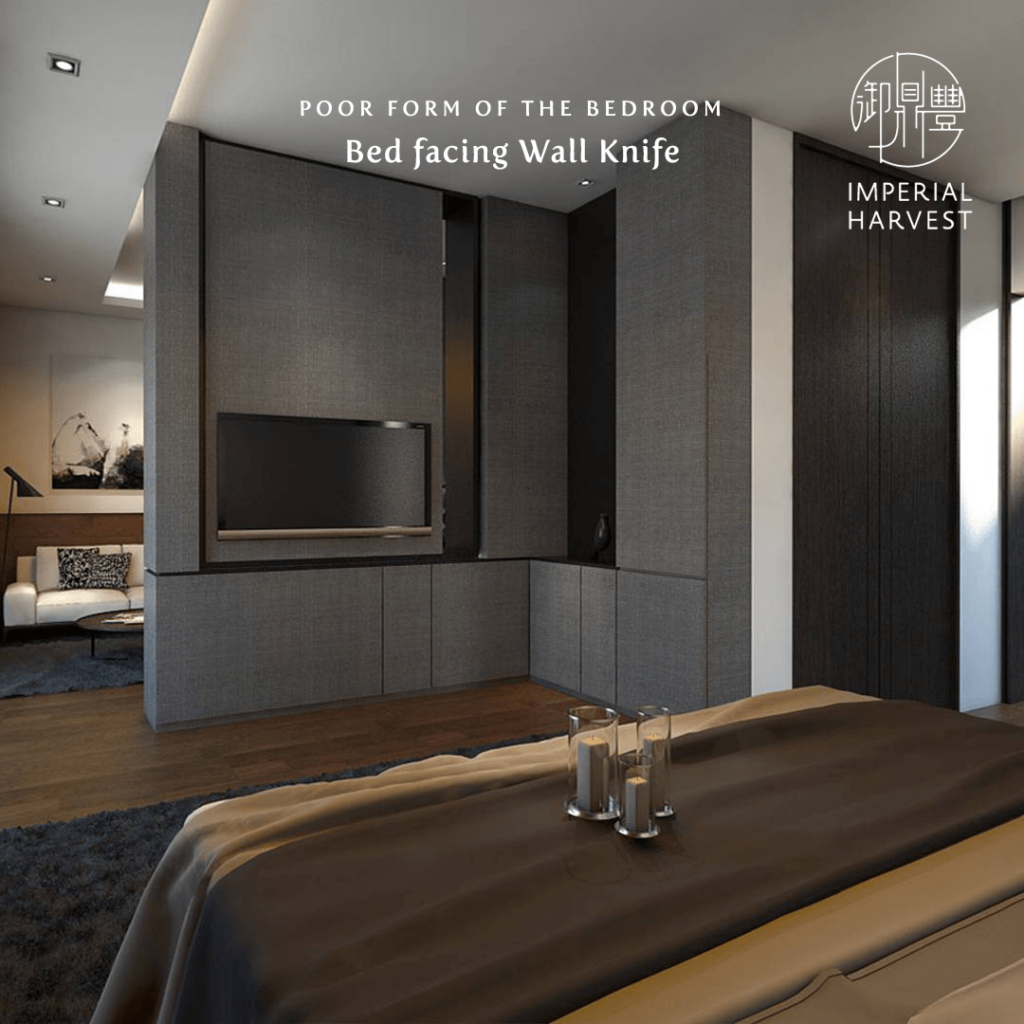
Bed headboard not against a solid wall: If the bed’s headboard is not against a solid wall and is placed against a window, for example, it can lead to poor sleep quality, rebellious thoughts, and ineffective communication.
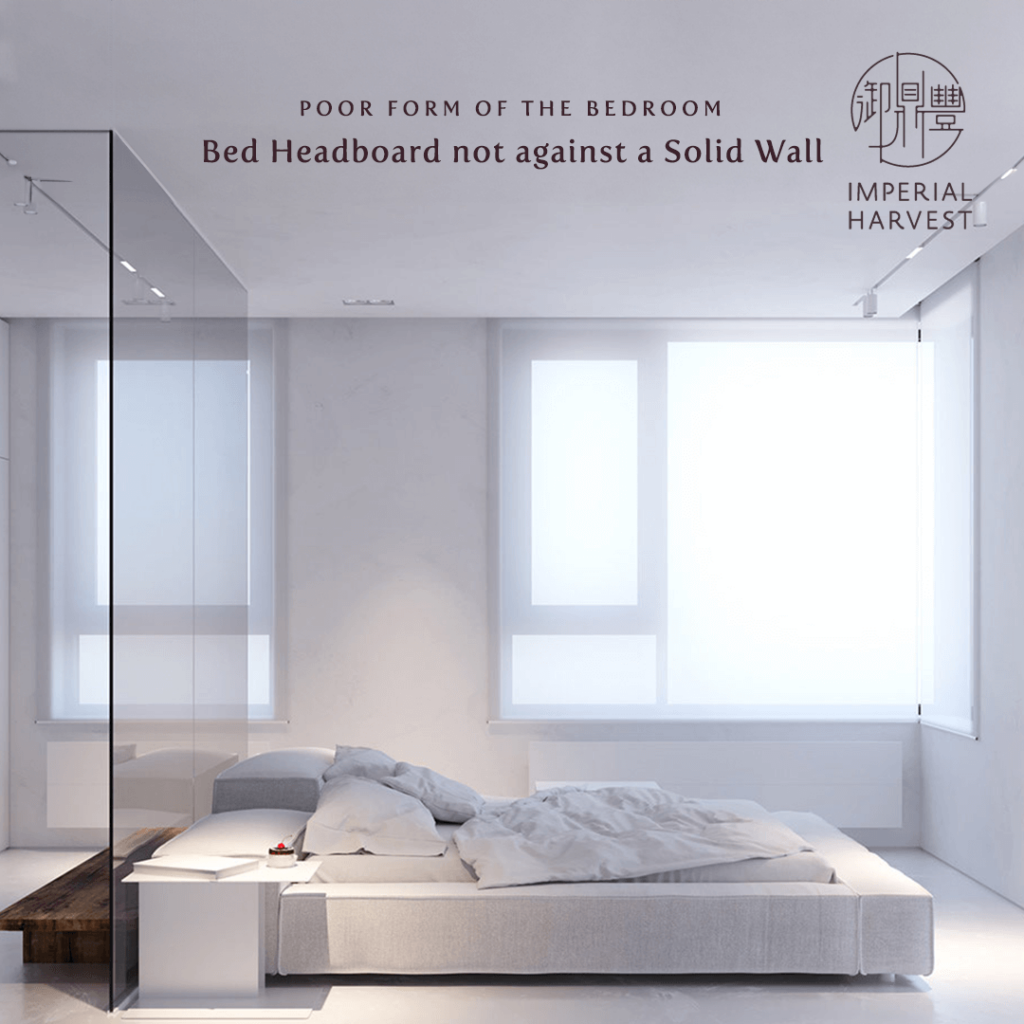
Bed directly below air conditioning: A bed directly under an air conditioning unit exposes the head, neck, and shoulders to cold airflow during sleep. This can lead to frequent colds, muscle tension, or other discomforts.
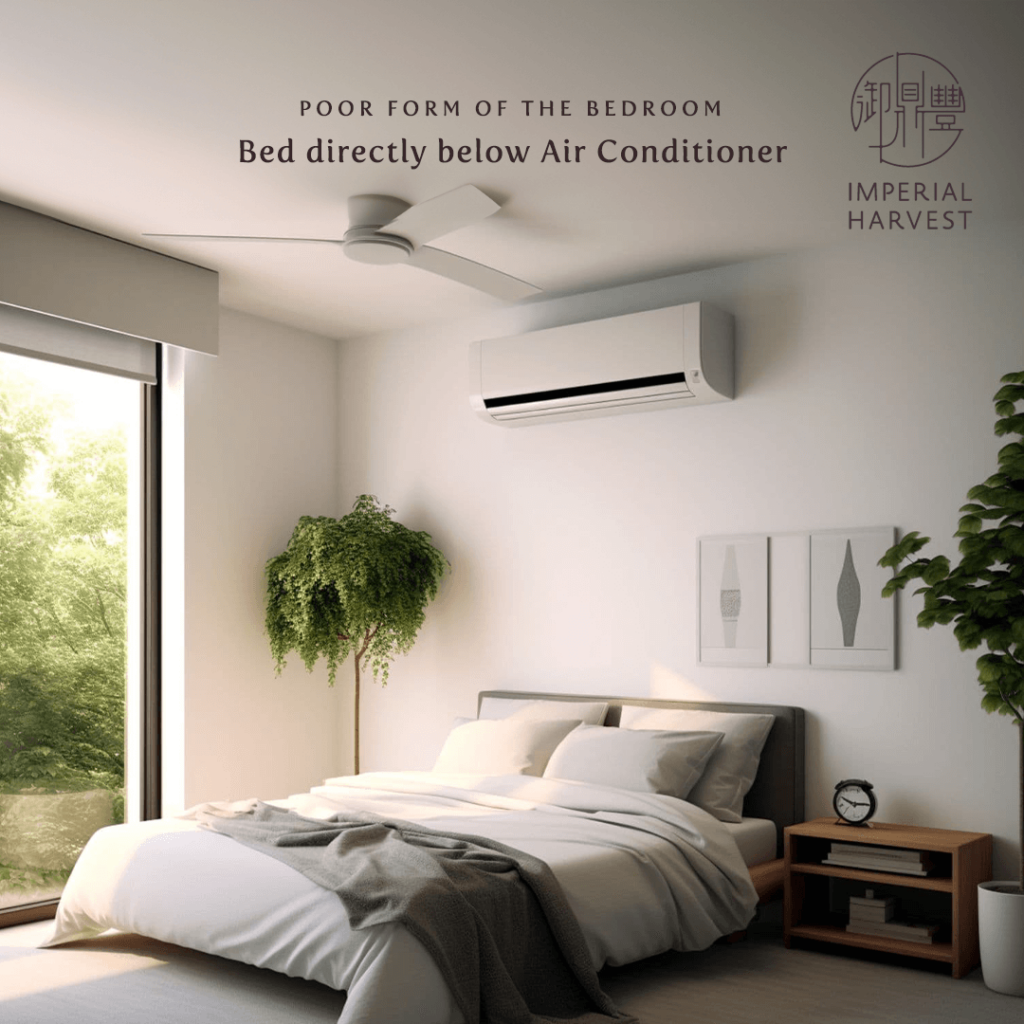
Technology and Gadgets in the Bedroom
Technology in front of the bed: Placing TVs, audio equipment, or mobile phones directly in front of the bed exposes occupants to electromagnetic waves, which can affect health. Additionally, watching TV in bed can lead to poor posture, sleep deprivation, and a disruption of daily routines.
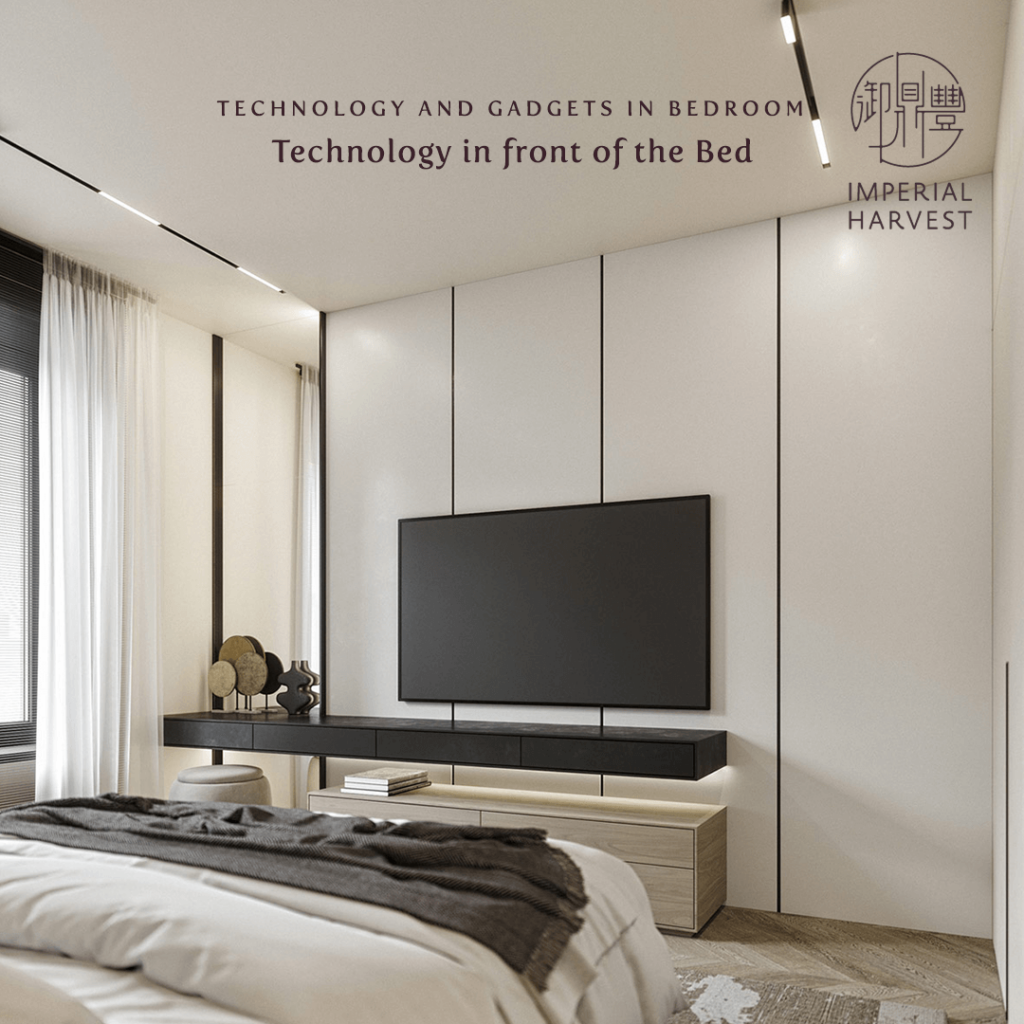
Excessive Bedroom Decor
Ceiling Decorations and Light Fixtures: Overly ornate ceilings with mirrors or unconventional light fixtures can cause unease and health problems. Beds should be free from overhead decorations, with lighting provided through bedside lamps, wall-mounted lamps, or hidden fixtures near the walls.

Living Room
Living rooms play a crucial role in home Feng Shui, as a well-arranged one can enhance comfort and bring good fortune, while a poorly planned one may impede a person’s inherent luck.
Incorrect Placement of Household Items and Furniture
Avoid clocks and mirrors at the entrance: Many homes open directly into the living room or a small foyer that leads to it. Placing a large dressing mirror at the entrance is common for convenience. While mirrors are handy for checking your outfit before leaving, they also deflect auspicious energies entering through the main door. This deflection can lead to poor financial luck and reduced opportunities for the occupants.
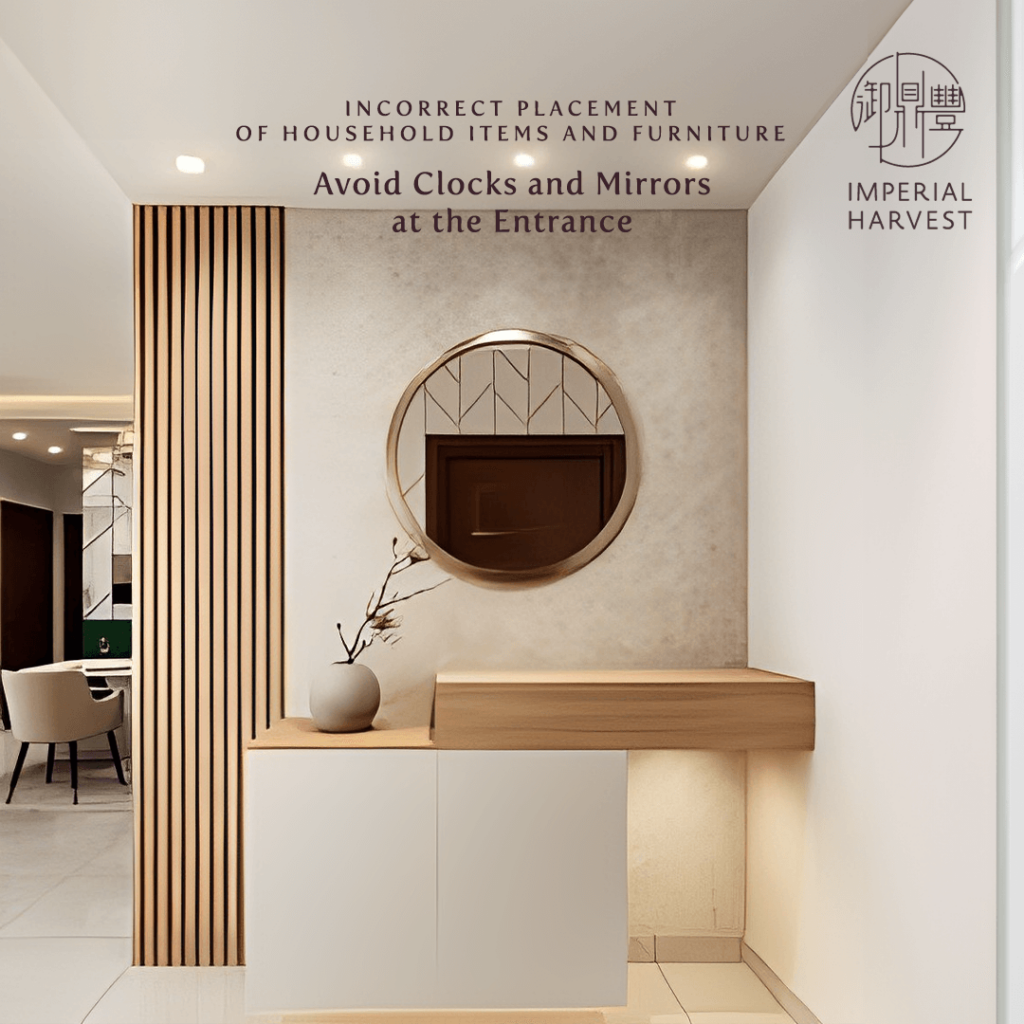
Avoid hanging swords or sharp objects: Hanging swords or sharp objects in the living room can result in frequent family disputes. Decor should feature smooth and rounded shapes to reduce the “sharpness” that may increase tension in the space where family members gather to relax and converse.
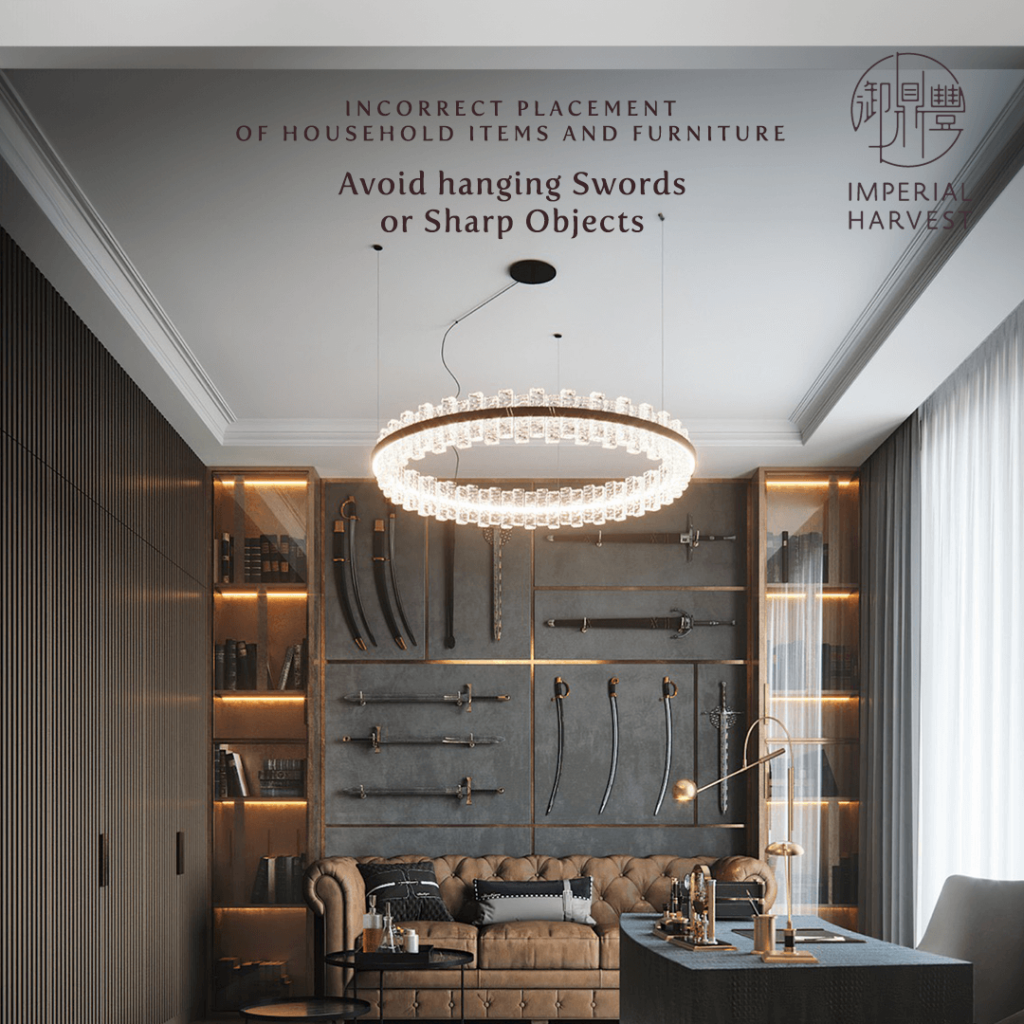
Avoid placing sofas under overhead beams: Beams can emit oppressive energy, impacting the health of those seated frequently beneath them, which is particularly concerning for children studying in the living room. Ensure their desks are not placed under a beam to prevent mental oppression and poor academic performance.
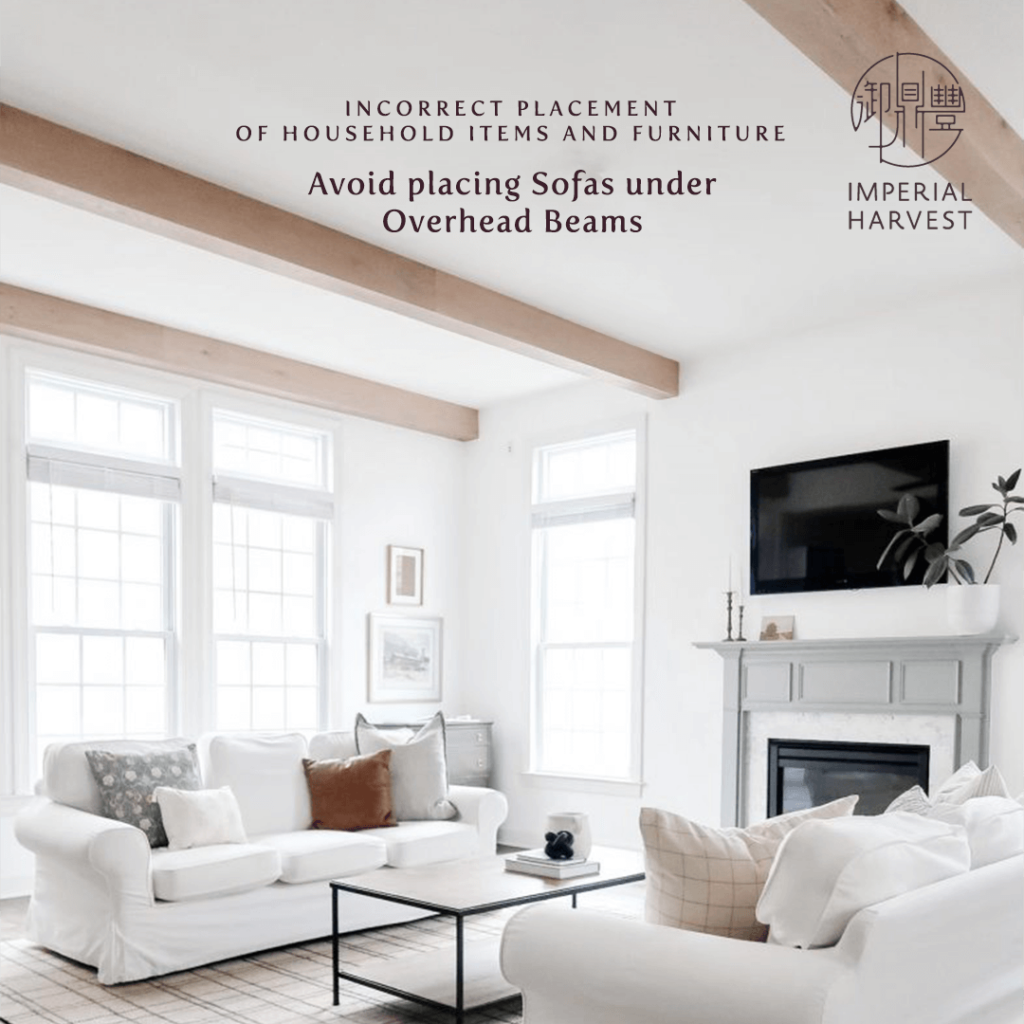
Incorrect Placement of Religious Altars
Improper placement of religious figurines can adversely affect the home’s fortune. The altar table should be positioned with its back against a solid wall, while religious figurines on it should not face doors, windows, toilets, kitchens, or dining tables, and should be kept to a minimum to maintain balance. Following these guidelines will help maintain a balanced, prosperous living environment conducive to relaxation and good fortune.
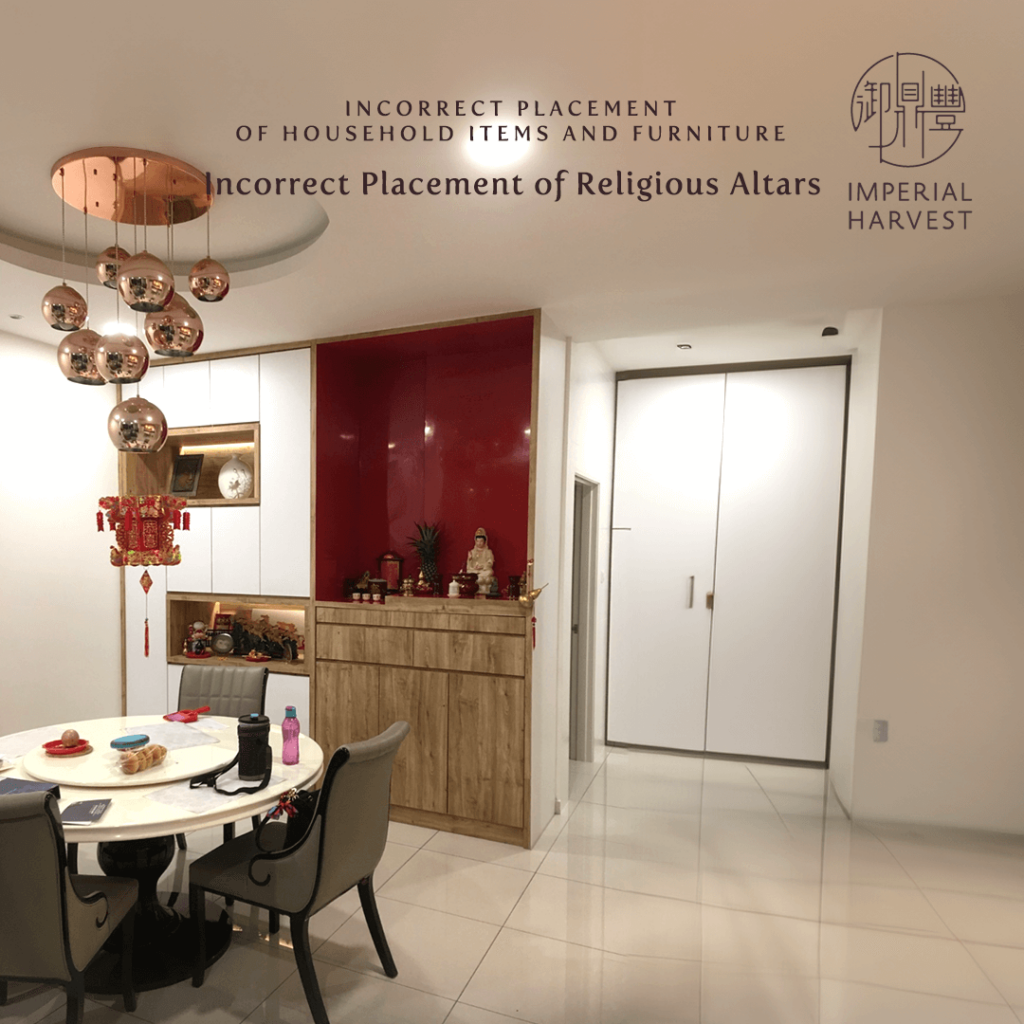
Imperial Harvest Imperial White Inkstones to Address Sha Qi
The Imperial Harvest Imperial White Inkstone stands out as a powerful treasure in the realm of Imperial Feng Shui, designed specifically to counteract the adverse effects of Sha Qi (煞气) while simultaneously activating the power and authority star.


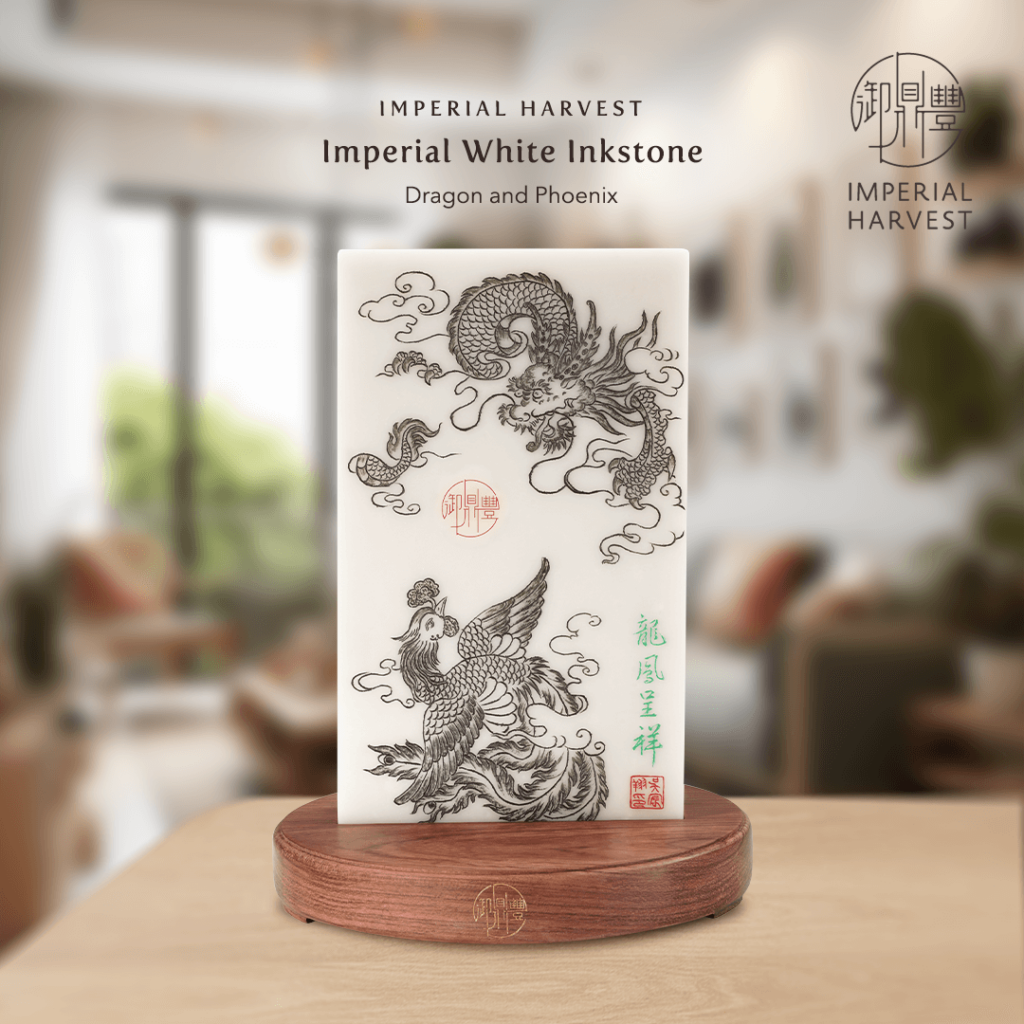
Origins of Imperial White Inkstone
The Imperial White Inkstone, the preferred and exclusive tier of inkstones, has been utilised by generations of Emperors to resolve Sha Qi, suppress misfortunes, and overcome obstacles. Sourced from the renowned mines of Duanxi, these inkstones are crafted from the finest white stone, esteemed for their exceptional purity and smooth texture.
Effects and Potency
The Imperial White Inkstone is revered for its ability to resolve Sha Qi, encompassing various forms of negative energy that can impact health, prosperity, and overall well-being. Sha Qi can arise from architectural flaws, such as sharp corners or improper orientations and lead to issues ranging from minor discomforts to significant misfortunes. The Imperial White Inkstone mitigates these issues by harmonising the space, neutralising the harmful effects of Sha Qi, and enhancing the flow of positive Qi.
Mitigating Sha Qi with the Imperial White Inkstone
Placement: The positioning of the Imperial White Inkstone is crucial. It should be placed in a manner that directly addresses the source of Sha Qi. For example, if negative energy emanates from a sharp corner and is directed towards a living area, the Imperial White Inkstone can be positioned facing this corner to counteract its effects.
Rituals: Incorporating traditional Feng Shui rituals can amplify the potency of the Imperial White Inkstone. These may include regularly cleansing the inkstone with natural water to maintain its purity and effectiveness, or pairing it with other Feng Shui symbols that complement its properties.
Master David conducts bespoke blessing rituals for every Imperial Harvest treasure. This meticulous process includes hand-drawing unique talismans for use in the consecration rites. Furthermore, Master David recites auspicious prayers before anointing each Imperial White Inkstone with specially prepared red vermilion.
Integration with other Feng Shui practices: For maximum effectiveness, the Imperial White Inkstone should be integrated into a broader Feng Shui strategy. This involves optimising furniture layout, ensuring appropriate lighting, and maintaining a balance of the five elements within the space.
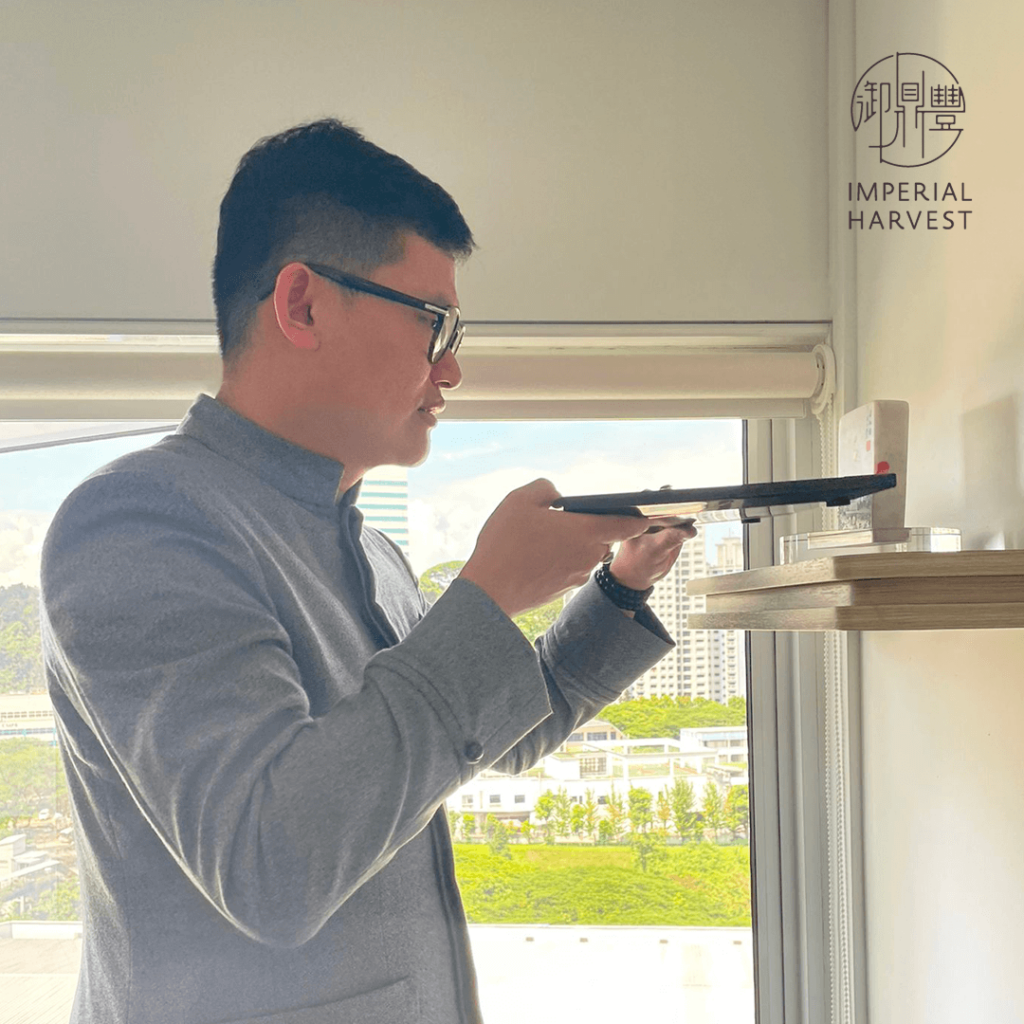
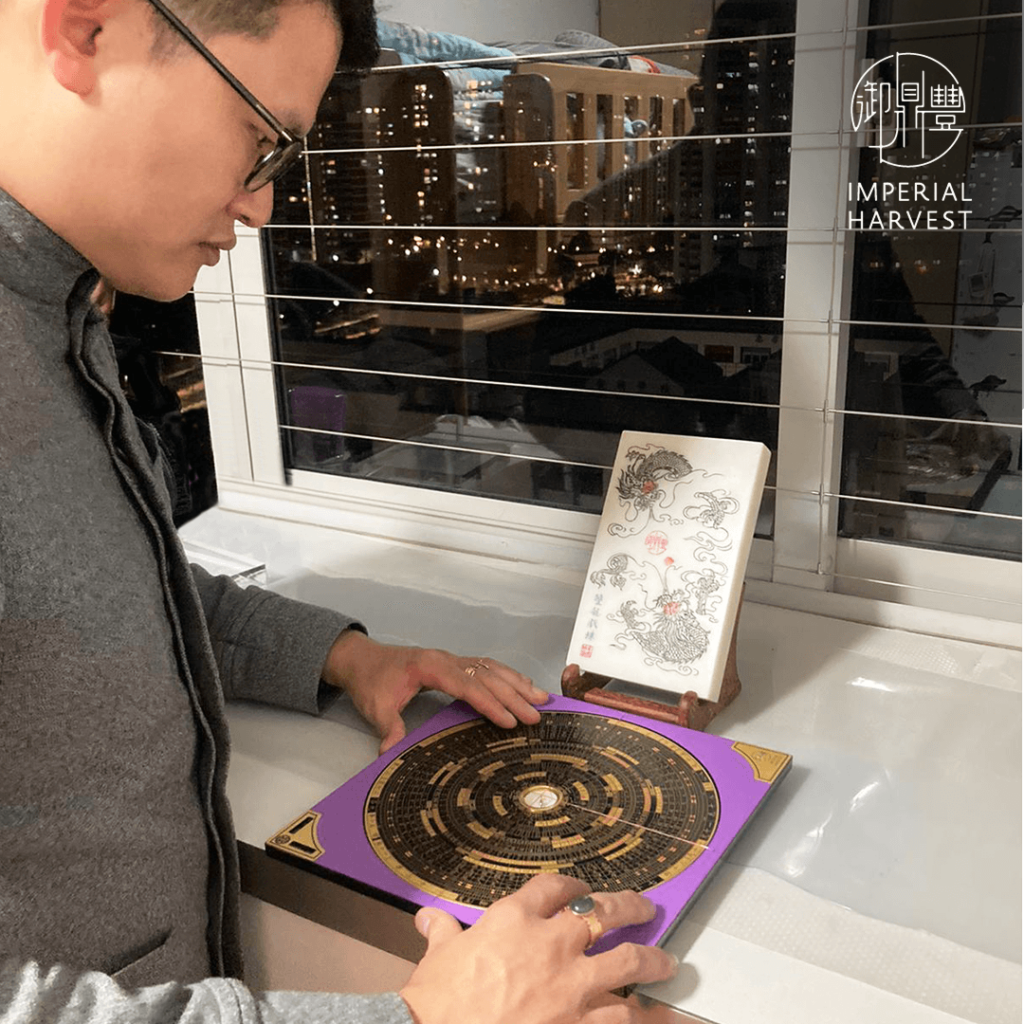
The Imperial Harvest Imperial White Inkstone transcends mere decoration; it stands as a powerful instrument in the Imperial Feng Shui arsenal, esteemed for its capacity to dispel Sha Qi and foster a thriving environment. Its application is especially recommended for areas where energy flow is hindered by structural elements or where a boost in positive energy is needed. By honouring its origins and understanding its profound capabilities, individuals can adeptly harness the Imperial White Inkstone’s power to cultivate an environment conducive to health, wealth, and happiness.
Continue for Millionaire Home Feng Shui (Part 3)
Imperial Harvest’s expert consultants are always on hand to guide you on your journey and provide you with insights to help you realise your fullest potential. Book a complimentary consultation today or contact us at +65 92301640.
We are located at
For prospective clients:Imperial Harvest402 Orchard Road
Delfi Orchard #02-07/08
Singapore 238876 For existing clients:Imperial Harvest Prestige
402 Orchard Road
Delfi Orchard #03-24/25
Singapore 238876
Most Read Articles
Get to read our life changing articles and get inspired.
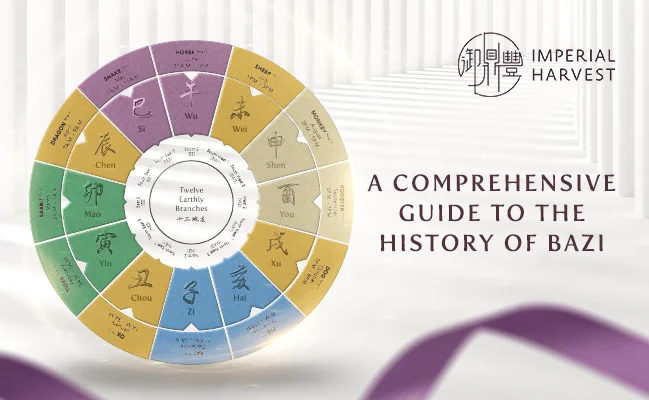
A Comprehensive Guide to the History of Bazi (八字)
Estimated Reading Time: 5 mins Bazi (八字) is often mistakenly assumed as the Chinese counterpart of western Astrology. The similarities between both systems lie in their utilisation of birth dates and time in their calculations, and the ability to be read from a tabulated chart. Where Astrology may take into account the positions of different […]
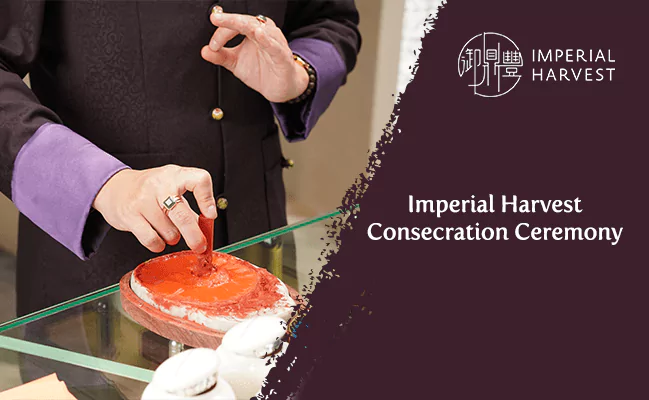
Imperial Harvest Consecration Ceremony
Estimated Reading Time: 5 mins At Imperial Harvest, each earthly treasure undergoes a series of consecration rites performed by Master David, before it is bestowed upon its blessed owner. Every aspect of these sacred Chinese anointing rituals is carefully examined and accurately represented in Master David’s blessings, reflecting Imperial Harvest’s deep respect for these esteemed […]

The Importance of Mountain and Water Stars
Estimated Reading Time: 4 mins “山管人丁,水管财”, is a well-cited principle in the study of Imperial Feng Shui that translates to “Mountains govern benefactors, authority and harmony, while Water governs wealth, opportunities and intuition”. This principle reiterates a critical factor in Imperial Feng Shui — balance is the key to achieving success in life. As mountain […]
